Maryland Documents
Quitclaim Deed
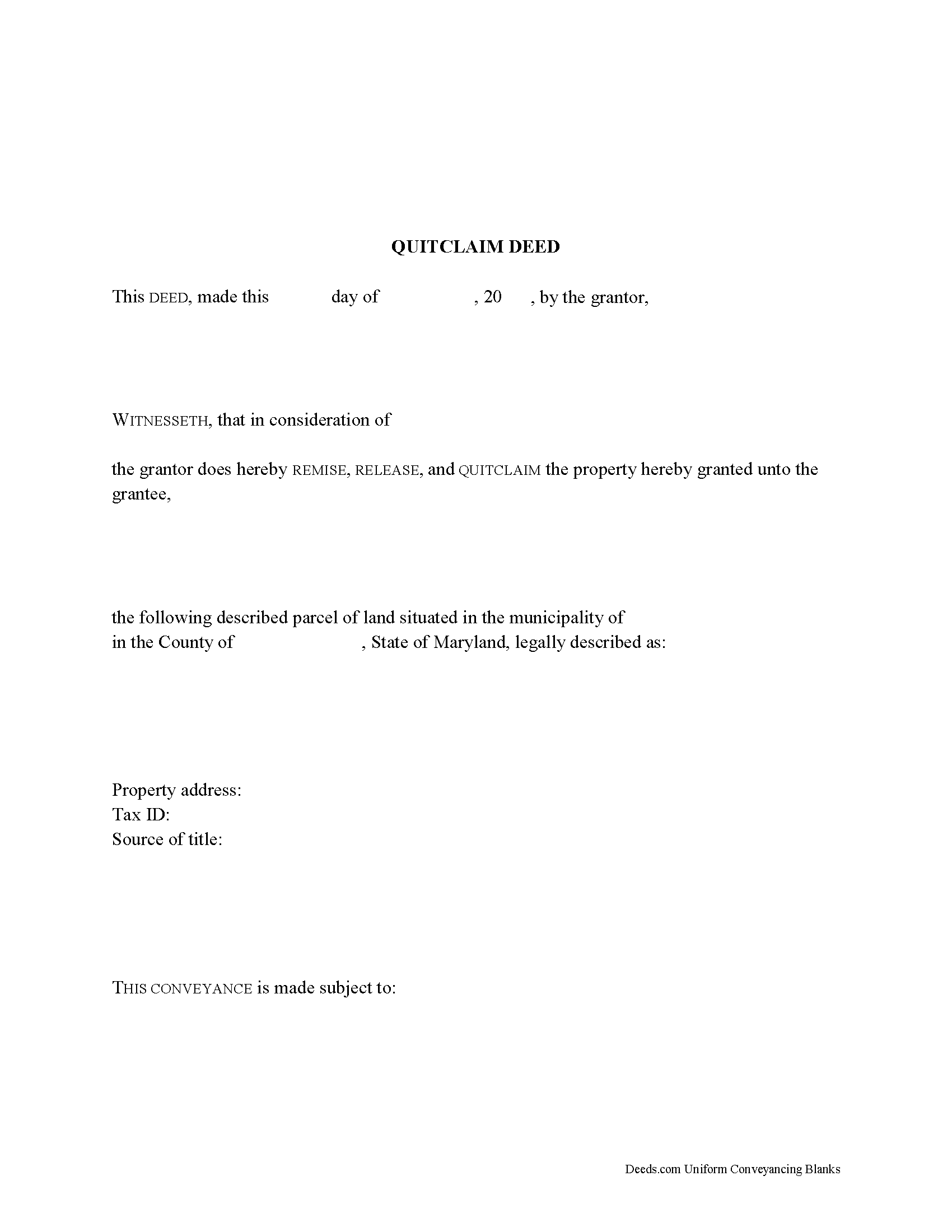
Although not defined in the statutes, Maryland accepts quitclaim deeds to transfer the rights, title, and interest in real estate, if any, from the grantor (owner) to the grantee (buyer), with no protections for the grantee. There may be potential unknown claims or restrictions on the title, and the buyer must accept the risk that the grantor may not have complete ownership of the property.
A lawful quitclaim deed identifies the name, address, and marital status of each grantor and grantee. State law requires that all recorded documents contain information on how the grantee will hold title. For Maryland residential property, the primary methods for holding title are tenancy in common, joint tenancy, and tenancy by the entirety. A grant of ownership of real estate to two or more unmarried persons is presumed to create a tenancy in common, unless expressly stated otherwise (Md. Code, Real Prop. 2-117). In the case of a married couple, a tenancy by the entirety is automatically created (Md. Code, Real Prop. 4-108).
State the source of title and a complete legal description of the property (Md. Code, Real Prop. 4--101). Give a certificate of preparation (Md. Code, Real Prop. 3-1... More Information about the Maryland Quitclaim Deed
Gift Deed
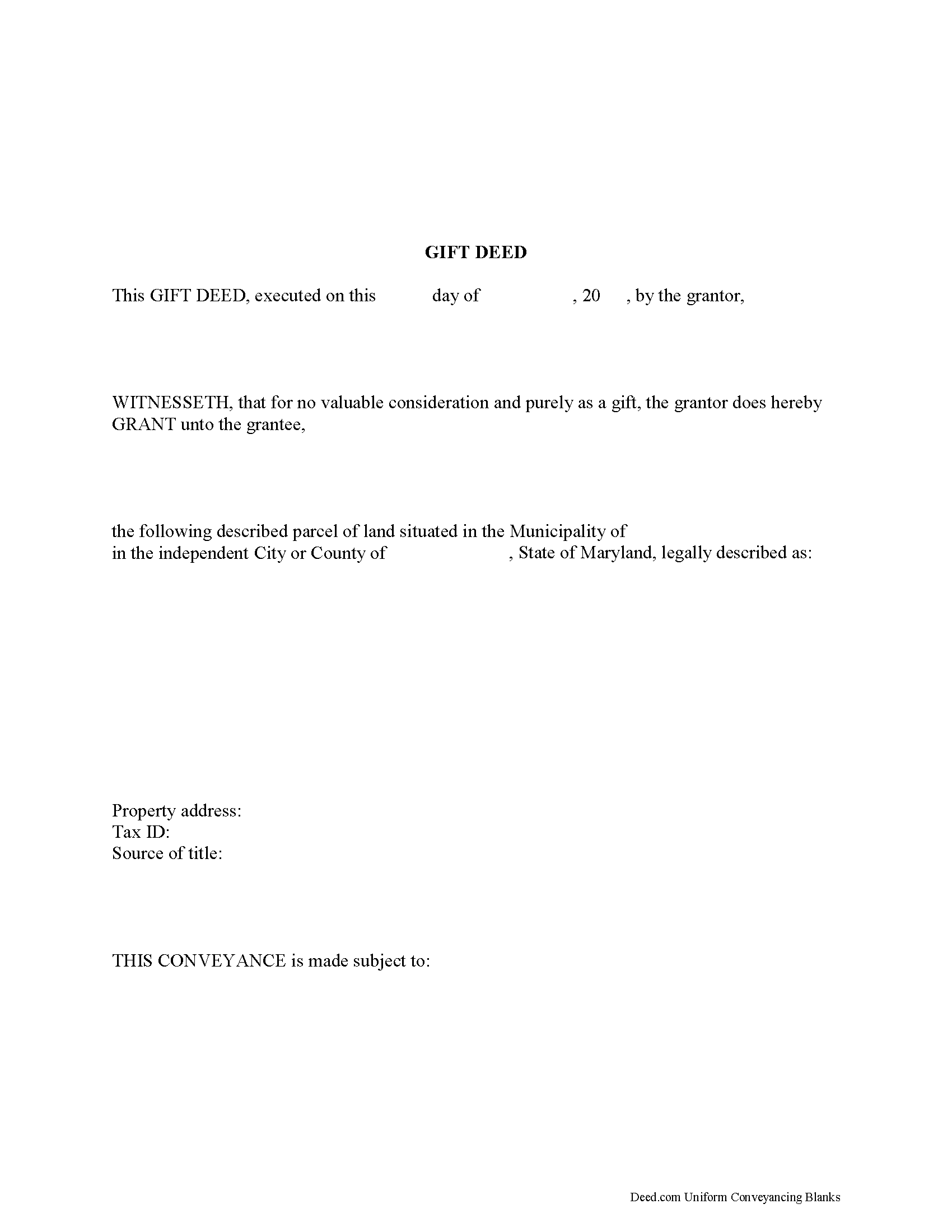
Gifts of Real Property in Maryland
A gift deed, or deed of gift, is a legal document voluntarily transferring title to real property from one party (the grantor or donor) to another (the grantee or donee). A gift deed typically transfers real property between family or close friends. Gift deeds are also used to donate to a non-profit organization or charity. The deed serves as proof that the transfer is indeed a gift and given without consideration (any conditions or form of compensation).
Valid deeds must meet the following requirements: The grantor must intend to make a present gift of the property, the grantor must deliver the property to the grantee, and the grantee must accept the gift. Gift deeds must contain language that explicitly states no consideration is expected or required, because any ambiguity or reference to consideration can make the deed contestable in court. A promise to transfer ownership in the future is not a gift, and any deed that does not immediately transfer the interest in the property, or meet any of the aforementioned requirements, can be revoked [1].
A lawful gift deed must also include the grantor's full name and marital status, as well a... More Information about the Maryland Gift Deed
Warranty Deed
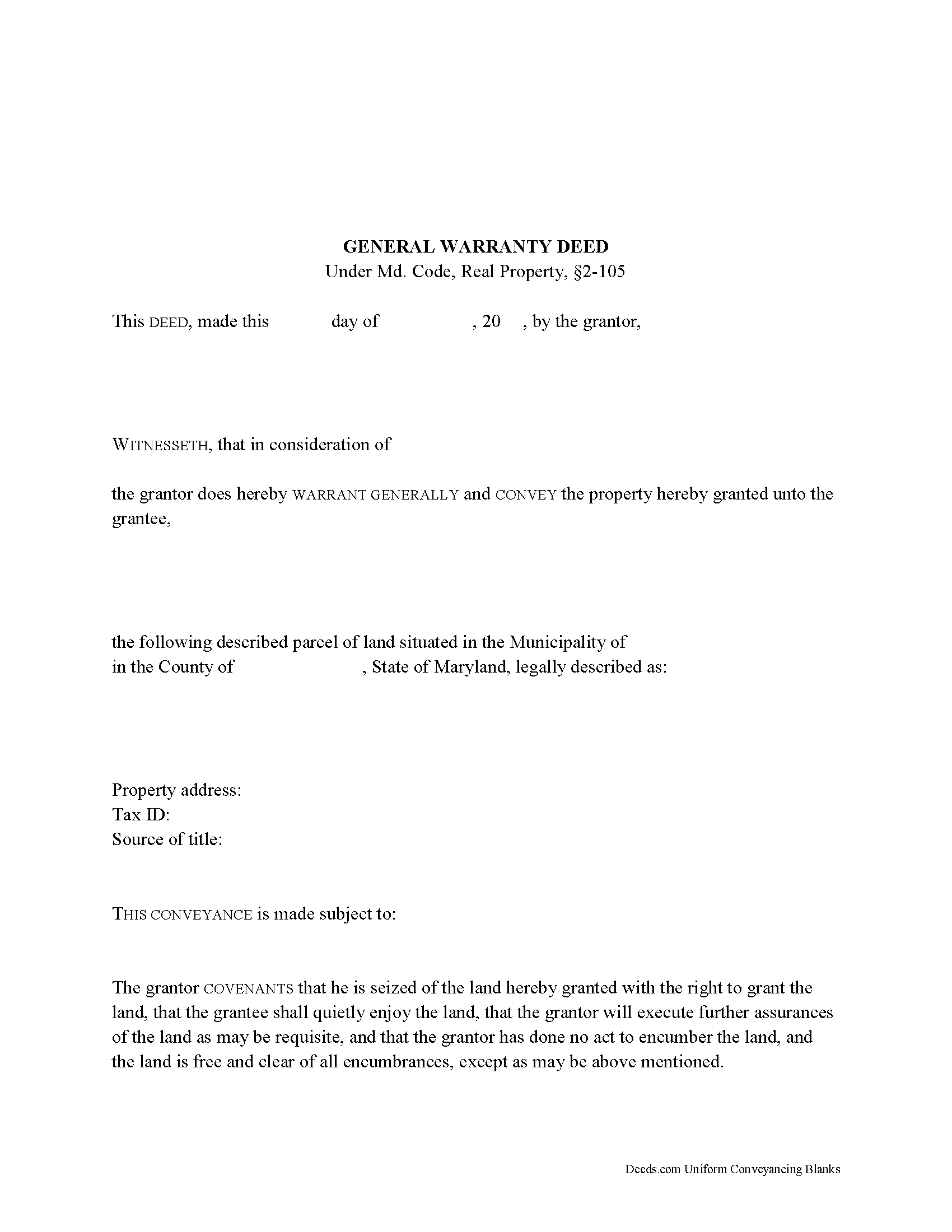
A general warranty deed under Md. Code, Real Property, 2-105 is a legal document used to transfer, or convey, rights in real property from a grantor (seller) to a grantee (buyer). This type of deed offers the highest level of protection for the grantee.
When using a general warranty deed, the grantor warrants that they are the true owner of the property and have the legal right to convey it, and that the property is free of liens or encumbrances unless otherwise listed in the deed [1]. Warranty deeds require statutory language that the grantor "will warrant generally the property hereby granted," meaning that the grantor will defend the grantee against every lawful claim and demand of any person against the title (Md. Code, Real Property, 2-105).
A lawful general warranty deed identifies the name, address, and marital status of each grantor and grantee. State law requires that all recorded documents contain information on how the grantee will hold title. For Maryland residential property, the primary methods for holding title are tenancy in common, joint tenancy, and tenancy by the entirety. A grant of ownership of real estate to two or more unmarried persons is presumed to ... More Information about the Maryland Warranty Deed
Special Warranty Deed
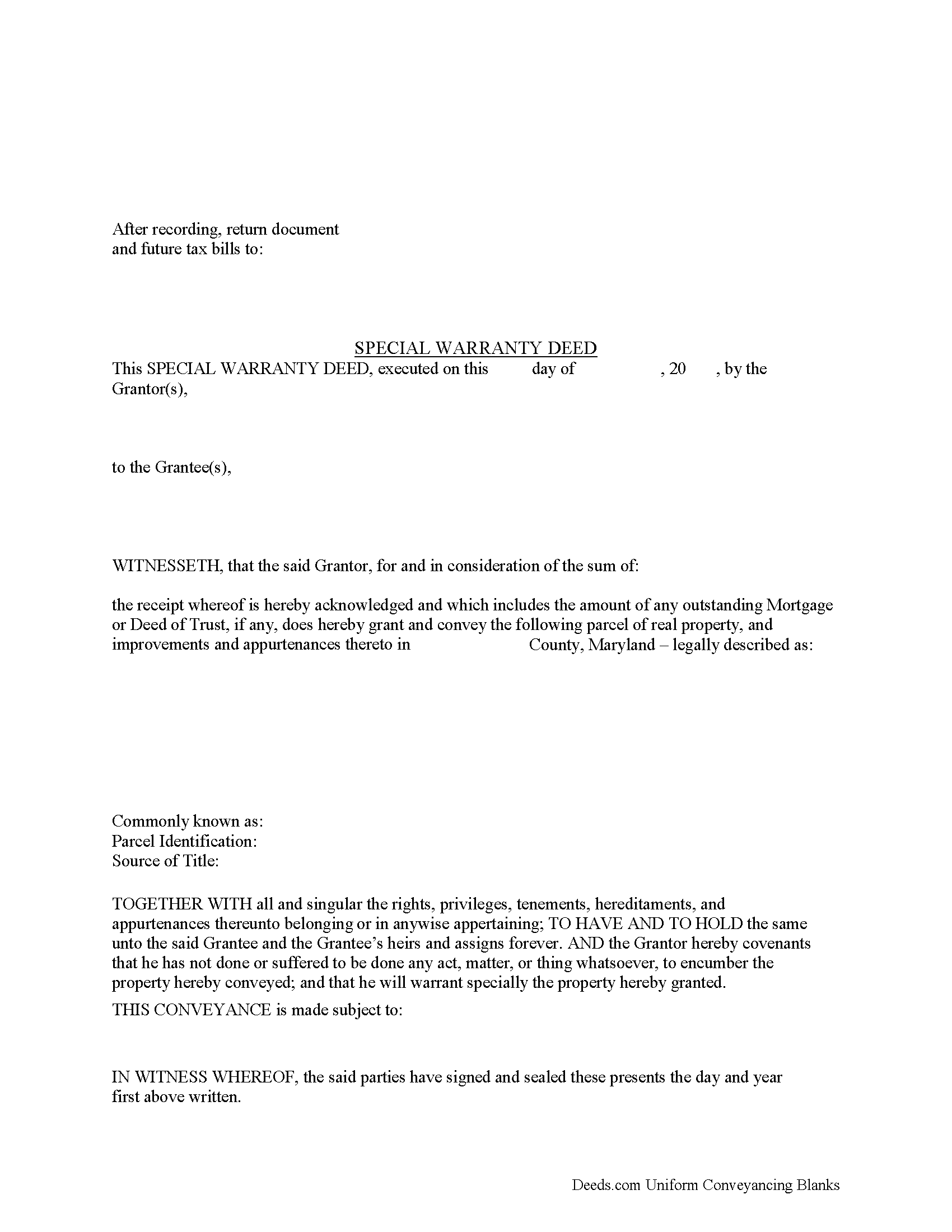
A conveyance of real property by special warranty includes a covenant from the grantor that he will "warrant specially the property hereby granted." This has the same effect as if the grantor had covenanted that he will warrant forever and defend the property to the grantee against any lawful claim and demand of the grantor and every person claiming or to claim by, through, or under him ( 2-106). Special warranty deeds are used in Maryland to transfer title. The forms offered in the Maryland Statutes are sufficient for their intended purposes. Any covenant, limitation, restriction, or provision can be annexed to or introduced with any of the statutory forms ( 4-201).
A special warranty deed in Maryland should contain the grantor's original signature, which must also be acknowledged. Maryland does not require witnesses for special warranty deeds. If a deed has been executed and acknowledged in accordance with the laws of another state, it will be accepted for recordation if the acknowledgement complies with Maryland law. When submitting a special warranty deed for recordation to the circuit court, it must be endorsed with the certificate of the collector of taxes of the county wh... More Information about the Maryland Special Warranty Deed
Grant Deed
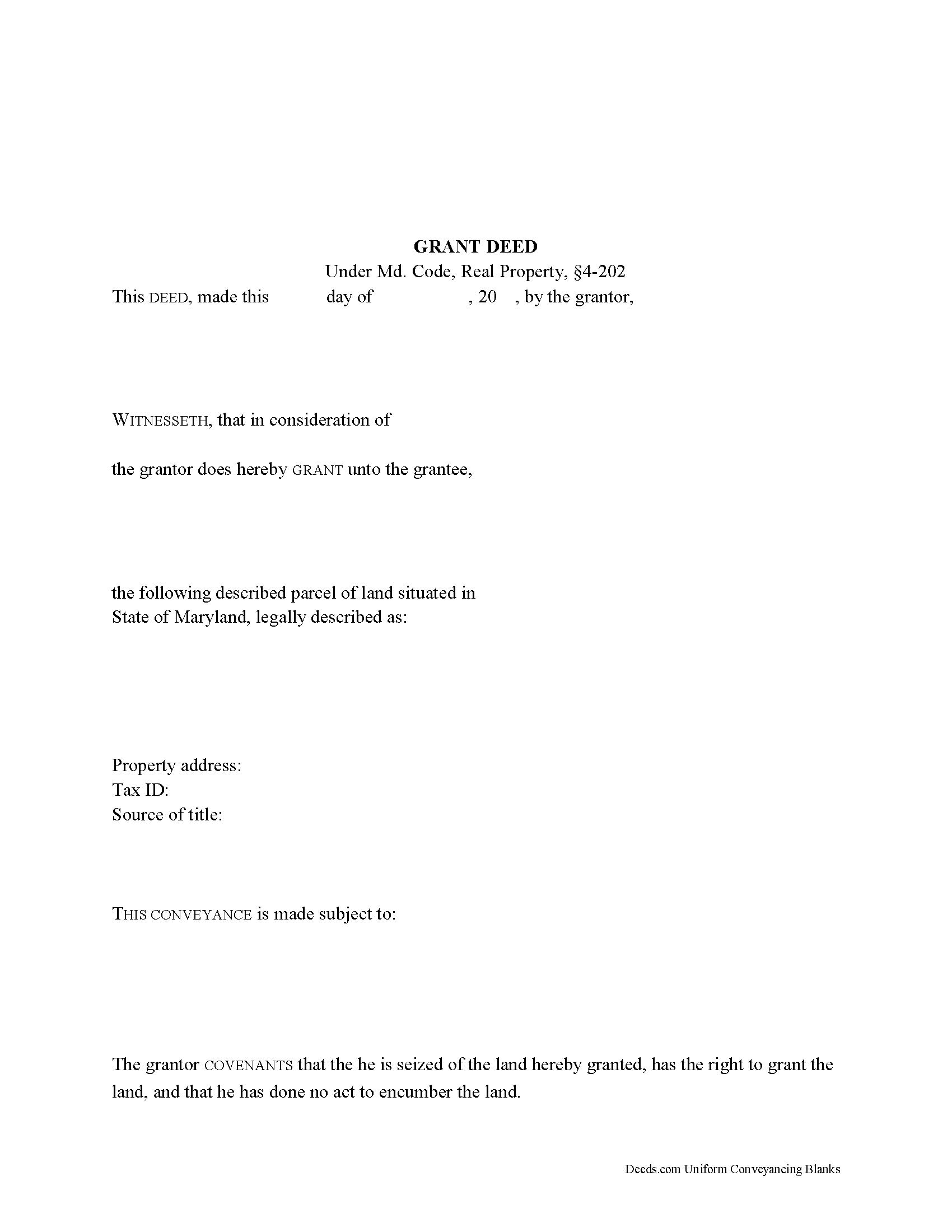
Grant deeds are statutory under the Maryland Code, Real Property, section 4-202. By using the word "grant," the grantor (owner) warrants to the grantee (buyer) that at the time of execution of the deed, he is in lawful possession of the land granted by the deed (Md. Code, Real Prop. 2-107) but does not warrant that he will defend title claims [1].
A lawful grant deed identifies the names, addresses, and marital status of each grantor and grantee, and information on how the grantee will hold title. For Maryland residential property, the primary methods for holding title are tenancy in common, joint tenancy, and tenancy by the entirety. A grant of ownership of real estate to two or more unmarried persons is presumed to create a tenancy in common, unless expressly stated otherwise (Md. Code, Real Prop. 2-117). In the case of a married couple, a tenancy by the entirety is automatically created (Md. Code, Real Prop. 4-108).
Include the source of title, a complete legal description of the property (Md. Code, Real Prop. 4--101), and a certificate of preparation (Md. Code, Real Prop. 3-104(f)(1)) in the deed. Submit a completed intake sheet along with the deed when recording (Md. Cod... More Information about the Maryland Grant Deed
Correction Deed
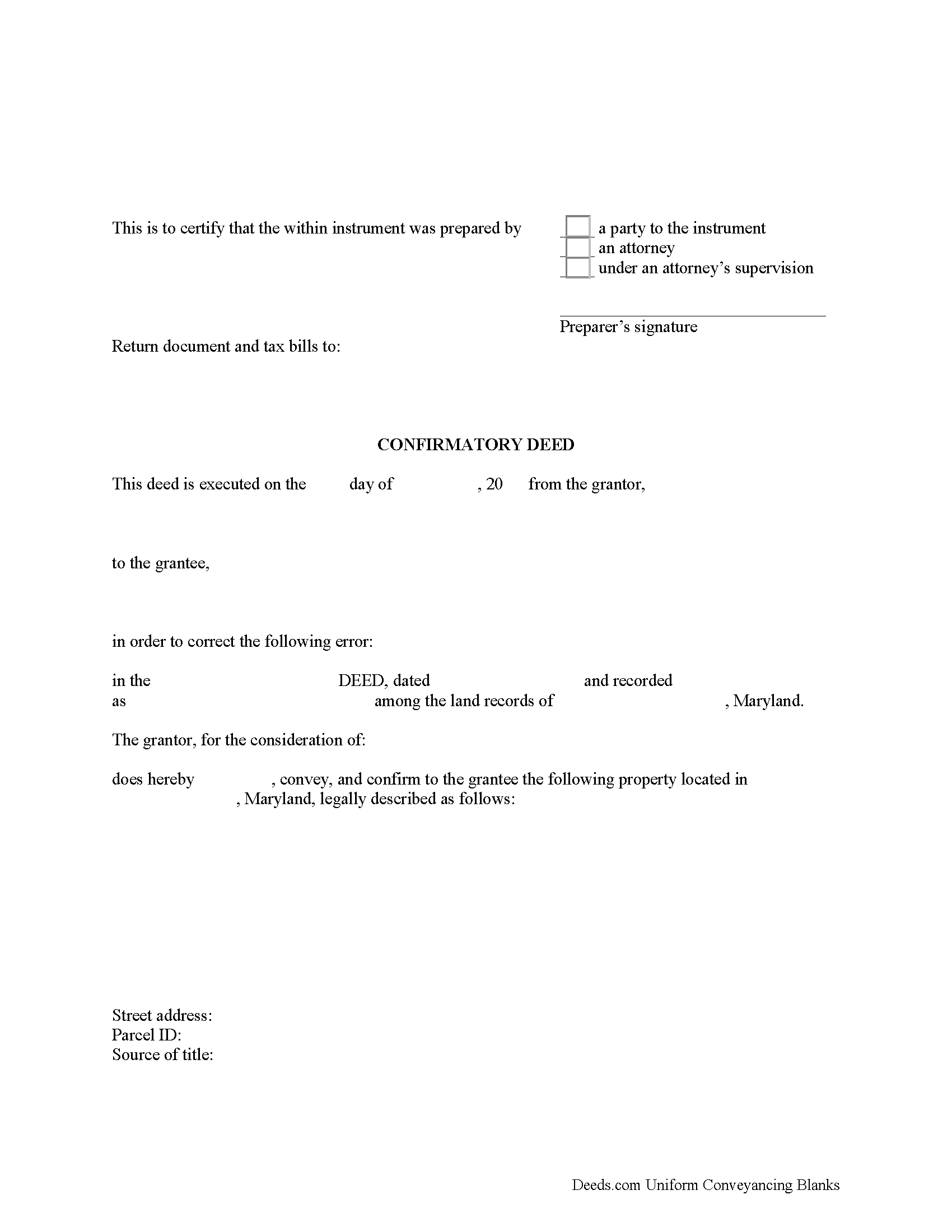
Use the confirmatory deed when correcting errors in a deed of conveyance in Maryland, such as a warranty, special warranty, or quitclaim deed.
In Maryland, the original deed cannot be amended for rerecording. If any changes or corrections are made, it becomes a supplemental instrument only and must follow requirements for such instruments. Instead, a newly drafted confirmatory deed, executed, acknowledged, and recorded, will have full legal status. It is in effect an explanation and correction of an error in a prior instrument and passes no title by itself. Beyond the correction, it restates the information given in the prior deed, thus reiterating and confirming it. The reason for the correction must be given by indicating the type of error to be corrected, and the original conveyance must be stated by date of execution and recording, recording number and location.
A confirmatory deed should be executed from the original grantor to the original grantee. Maryland statutes require that the "party or parties affected" sign a deed (3-301(c)), which generally includes the grantee. Specific defects in instruments, according to Md. Ann. Code art. 4-109, are a defective acknowledgm... More Information about the Maryland Correction Deed
Easement Deed
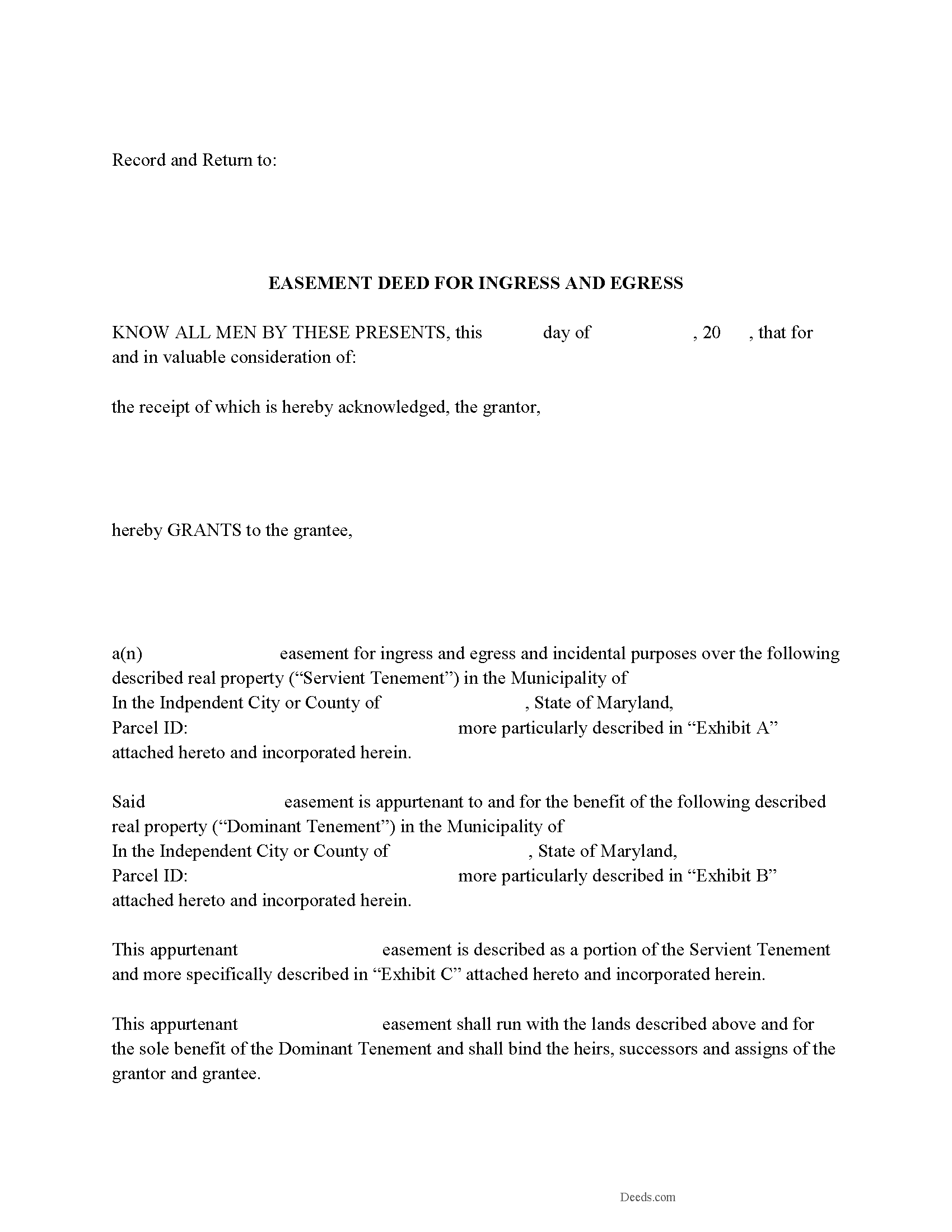
An easement is the right of a person to use the real property of another person for a specific purpose. Easements are non-possessory and non-ownership interests in real property. The instrument that creates this right is the easement deed. Easements are generally categorized as being affirmative or negative, and can also be appurtenant or in gross. An appurtenant easement benefits the dominant estate and runs with the land; whereas an easement in gross benefits an individual or legal entity, rather than a dominant estate. Easements in Maryland can be created by deed, will, or contract; by prescription; or by implication.
A solar easement is an interest in land that is conveyed or assigned in perpetuity and limits the use of the land to preserve the receipt of sunlight across the land for use of a property owner's solar collection system ( 2-119). A solar easement can be created by written instrument.
Every deed in Maryland granting a right-of-way or other easement to a public utility, public agency, or a department or agency of the State should contain an accurate and definite description as well as a reference to the liber and folio where the servient land was granted and a ... More Information about the Maryland Easement Deed
Termination of Easement
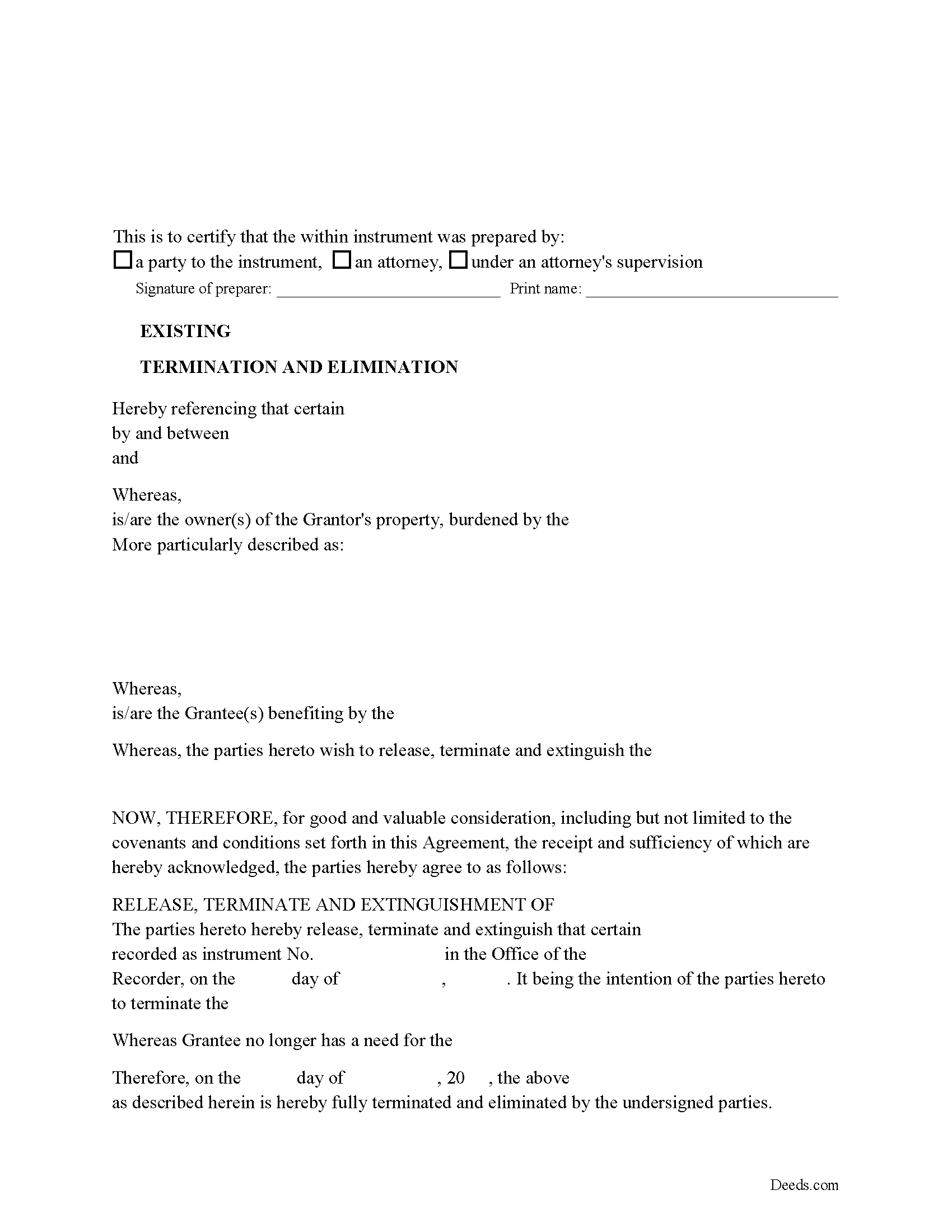
Use this form to release, terminate, extinguish a previously recorded document that involves access to and from a property.
Documents such as:
1. Easement Deeds or Agreements (An easement is a non-possessory interest in land, granting the right to use someone else's property for a specific purpose, like a driveway or utility line)
2. Access Roads
3. Right of Ways
4. Utility Easements (Power, Gas, Water, Sewer, Etc.)
5. Drainage Easements
This document allows the owner of the land, burdened by the access and the party that benefits from the access, to sign an agreement releasing the property from such access, ... More Information about the Maryland Termination of Easement
Deed of Trust and Promissory Note
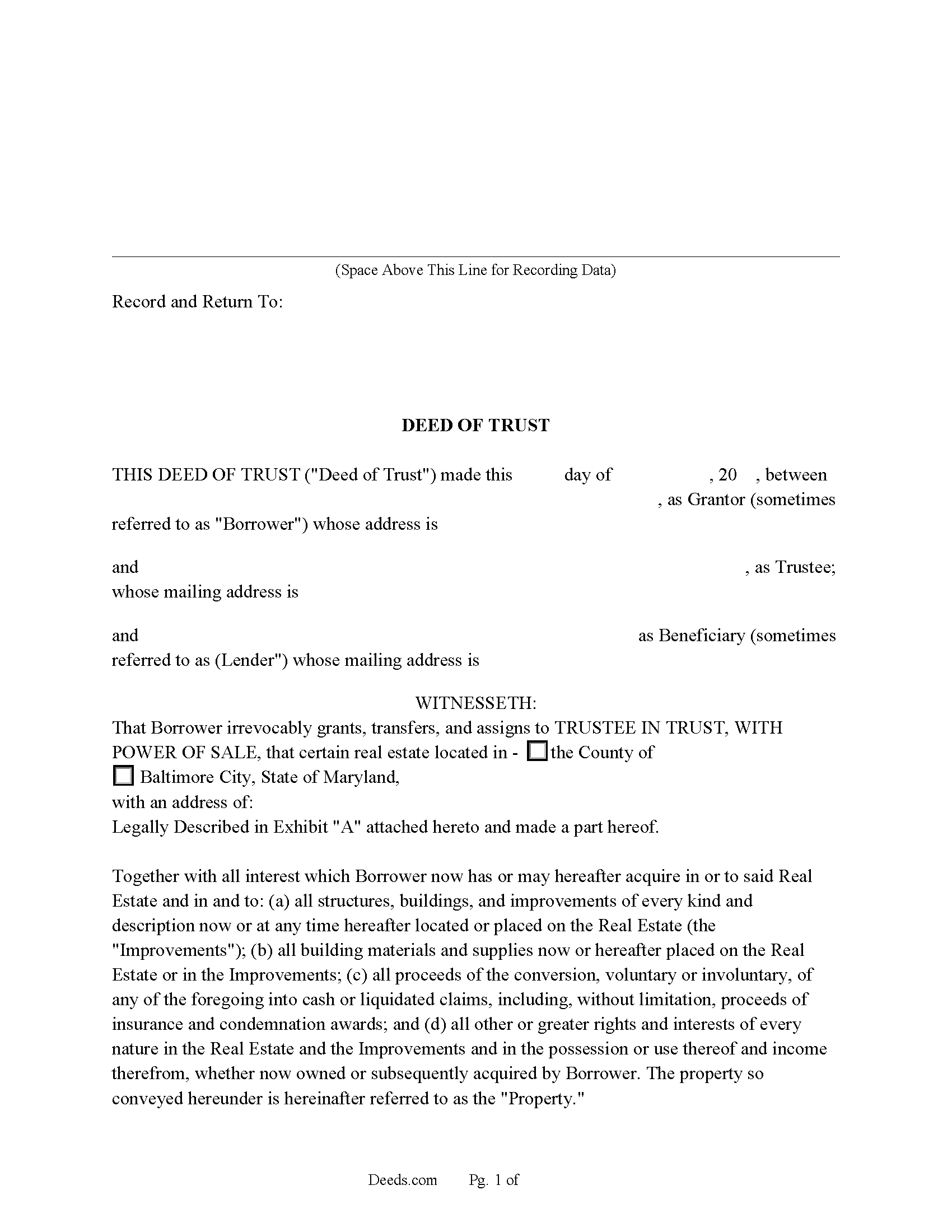
Use these forms to finance residential property, vacant land, condominiums, planned unit developments and small commercial property. ("Residential Property" means real property improved by four or fewer single family dwelling units that are designed principally and are intended for human habitation.) If a property meets these standard a "License Information or Affidavit filed in Accordance with Real Property Article" form is required. This Deed of Trust contains a "Power of Sale" clause which shall be made in accordance with the provisions of Section 7-105, Real Property Article, Annotated Code of Maryland, as amended, and Rules 14-201 through 14-210 of the Maryland Rules, as amended, or other applicable general or local laws of the State of Maryland or judicial rules of procedure relating to the foreclosure of Deeds of Trusts. A Deed of Trust with stringent default terms and conditions can be beneficial to a lender in the case of default. Included is an ["Affidavit of Consideration" required for mortgage or deed of trust.] (3-104.1(a)) [4-106(a)]
(Maryland DOT Package includes forms, guidelines, and completed examples) For use in Maryland only.
... More Information about the Maryland Deed of Trust and Promissory Note
CERTIFICATE OF RELEASE for Deed of Trust or Mortgage
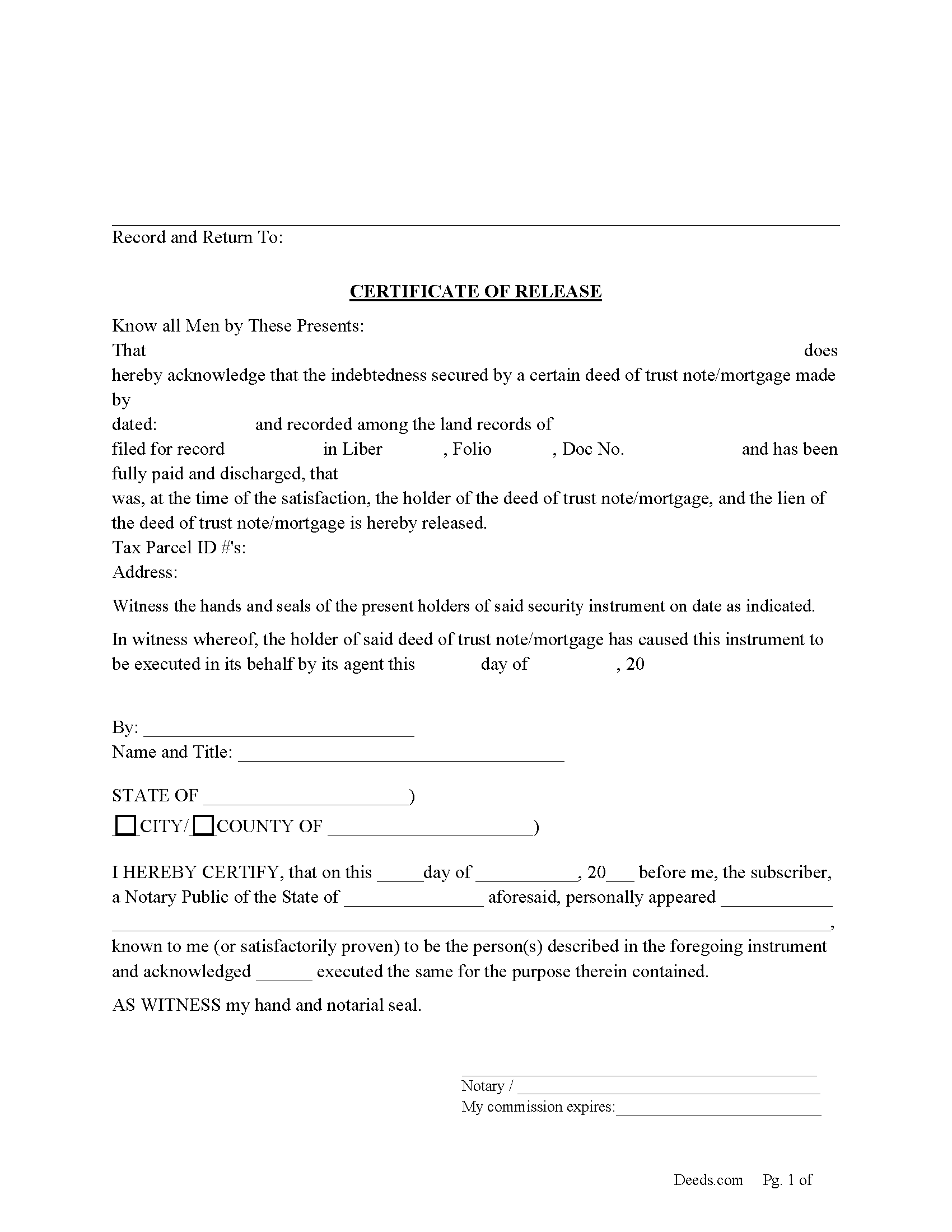
Both Deeds of Trusts and Mortgages are used as security instruments in Maryland. This form is used by the beneficiary/lender and/or agent acting on behalf of to fully release a Deed of Trust or Mortgage upon satisfaction. A lender generally has 30 days to record and notify to avoid penalty.
(The required evidence of a recorded release shall be mailed or delivered to the vendor and purchaser within 30 days from the delivery of the deed granting title to the property. (7-106(2))
(Maryland Certificate of Release Package includes form, guidelines, and completed example)... More Information about the Maryland CERTIFICATE OF RELEASE for Deed of Trust or Mortgage
APPOINTMENT OF SUBSTITUTE TRUSTEE(s) - for Deed of Trust
---for-deed-of-trust.png)
Use this form to substitute an existing Trustee in a previously recorded Deed of Trust. This is often done when the Trustee of record can't or won't act or upon default/foreclosure of the Deed of Trust.
"Trustee" means a person, other than the beneficiary, to whom a trust deed conveys an interest in real property, or the person's successor in interest, or an employee of the beneficiary, Under Maryland Real Property 7-105 and Maryland Rule 14-214(b)(2), corporate trustees may not exercise the power of sale. An individual (i.e., a "natural person") appointed as trustee in a deed of trust or as a substitute trustee shall conduct the sale of property subject to a deed of trust. The individual need not be a Maryland resident.
(If a mortgage or deed of trust allows for the appointment or substitution of a trustee or an individual authorized to exercise a power of sale, the holder of the mortgage or deed of trust may make the appointments or substitutions from time to time.) ( 7-105(5))
(Maryland Appointment of ST Package includes form, guidelines, and completed example) For use in Maryland only.
... More Information about the Maryland APPOINTMENT OF SUBSTITUTE TRUSTEE(s) - for Deed of Trust
Assignment of Deed of Trust - Mortgage
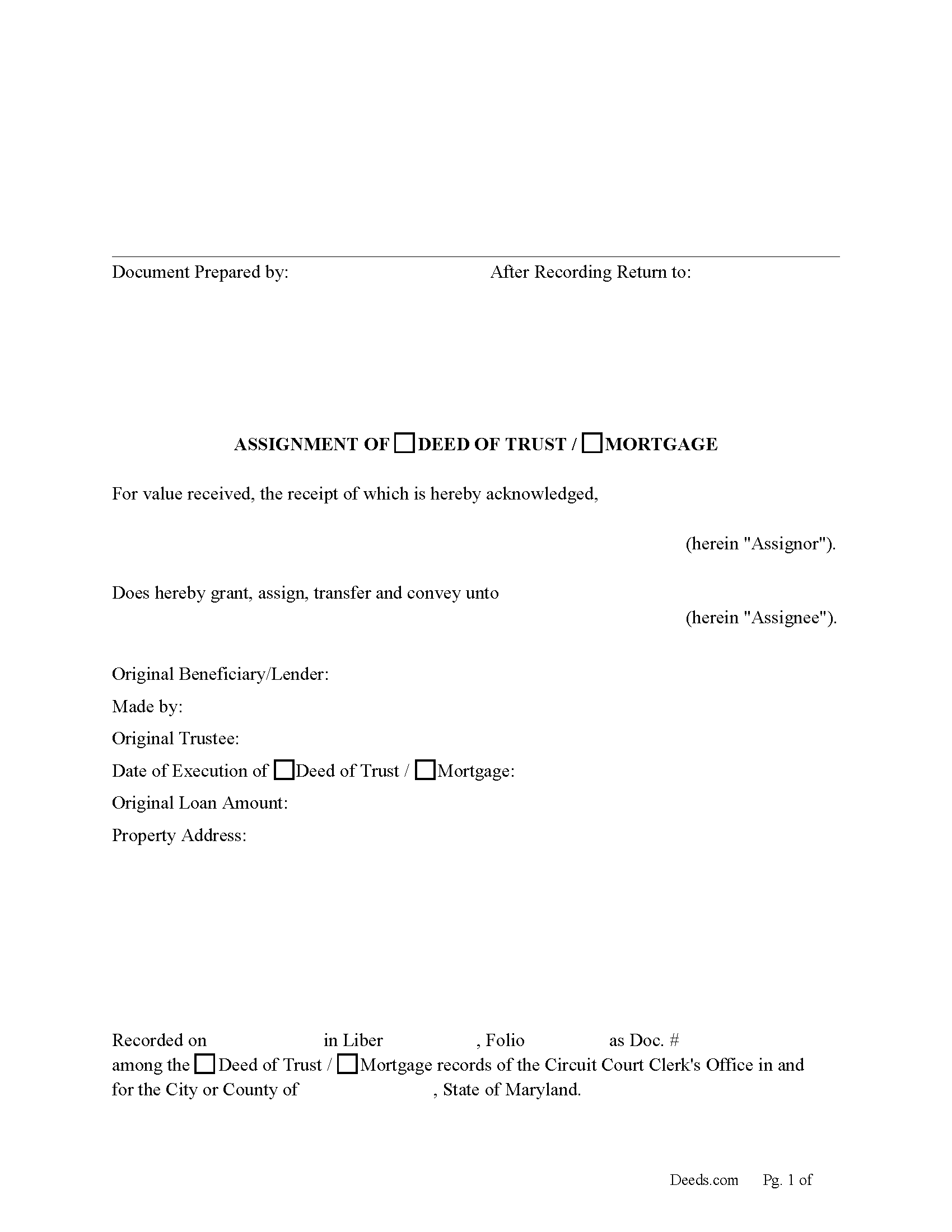
Both Deed of Trusts and Mortgages are used as security instruments to secure a debt on real property in Maryland. This form is used to assign either to another party, often used when the debt is sold to another lender.
(The clerk of the court shall record photographically any assignment of a mortgage with an attachment or rider affixed to it containing the names of the parties as they appear on the original mortgage and a reference to the book number and page number where the mortgage is recorded.) (3-106 - Recording of assignments of mortgages)
Notice of Assignment Form Included.
The Truth and lending act requires that borrowers be notified when their Deed of Trust/Mortgage debt has been sold, transferred, or assigned to a new creditor.
(Maryland Assignment Package includes form, guidelines, and completed example) For use in Maryland only.... More Information about the Maryland Assignment of Deed of Trust - Mortgage
Personal Financial Power of Attorney Statutory Form
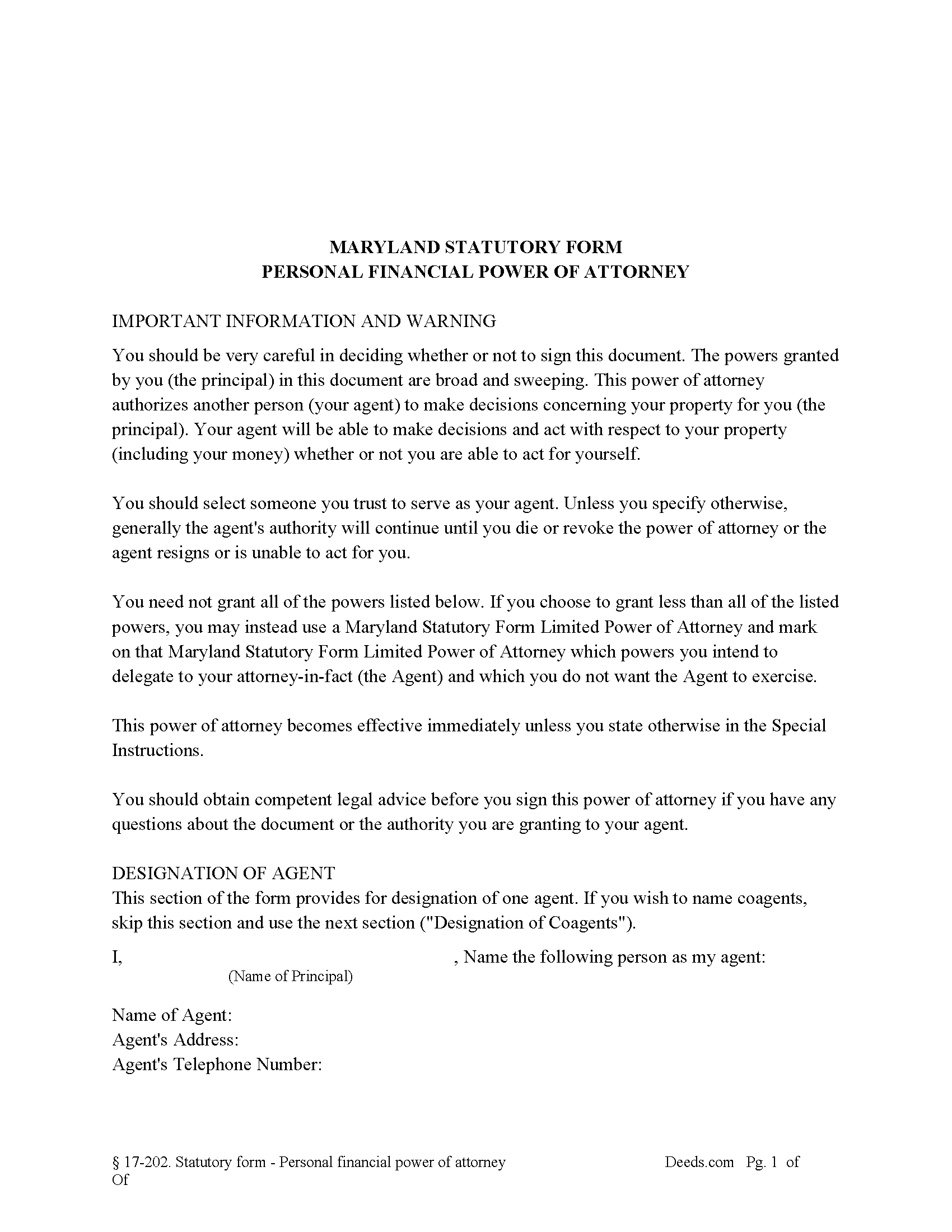
17-202. Statutory form - Personal financial power of attorney
Powers included;
Real property
Stocks and bonds
Banks and other financial institutions
Insurance and annuities
Claims and litigation
Taxes
17-101 (b)(1) "Agent" means a person granted authority to act for a principal under a power of attorney, whether denominated an agent, attorney--in--fact, or otherwise.
(2) "Agent" includes an original agent, coagent, successor agent, and a person to which an agent's authority is delegated.
This form allows for successor agents in the case an agent can't or won't act, co-agents (two or more agents) who are required to act together unanimously unless you otherwise provide in this form.
Included is an "Agents Certification Form" often required by third parties, when an agent acts on behalf of the principal.
17-101 (e) "Principal" means an individual who grants authority to an agent in a power of attorney.
Proper notary authentication.
17-110. Requirements
(a) A power of attorney executed on or after October 1, 2010, shall be:
(1) In writing;
(2) Signed by the principal or by some other person for the principal, in the presence of the principal, an... More Information about the Maryland Personal Financial Power of Attorney Statutory Form
Statutory Limited Power of Attorney for Real Property
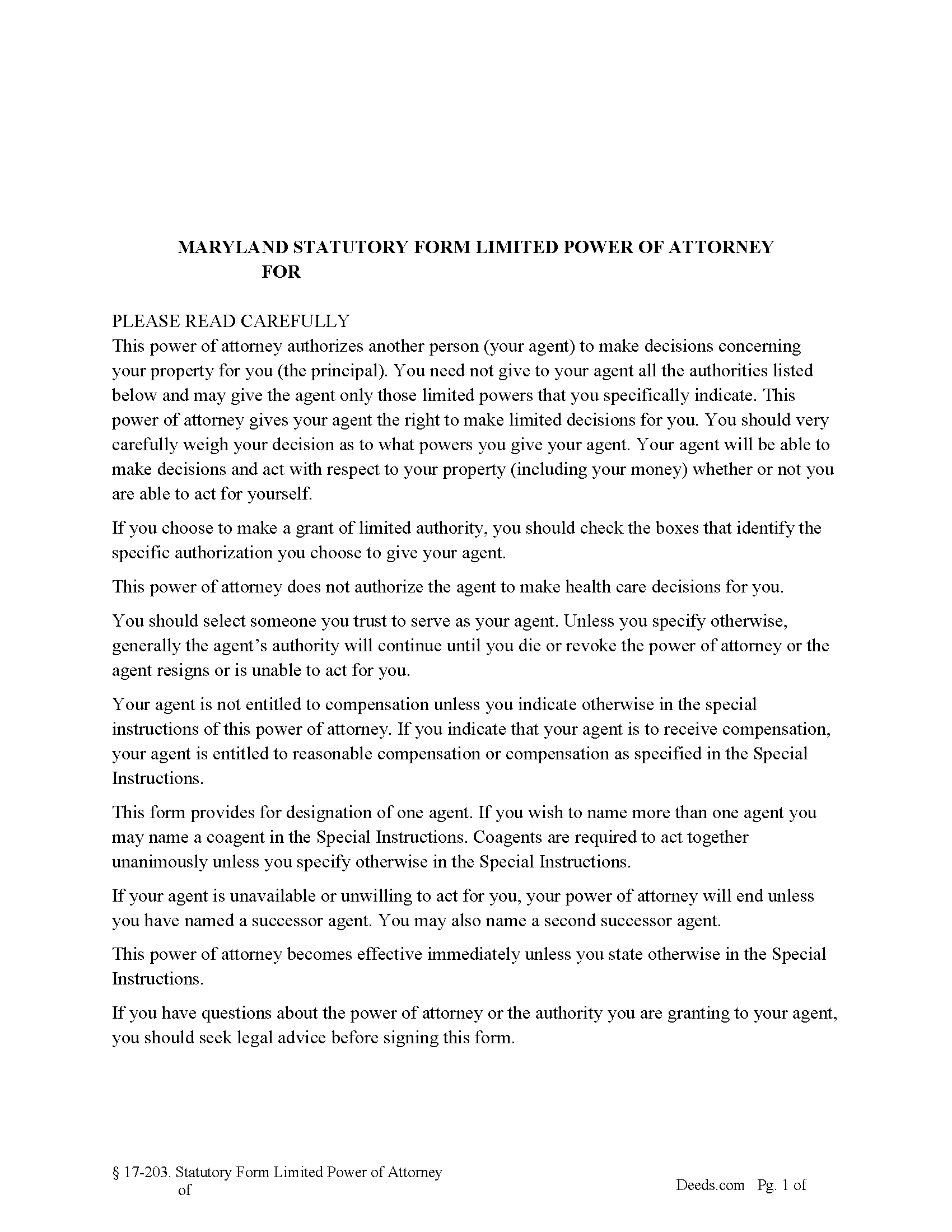
Use this form to allow an agent of your choice to sell, purchase, borrow and/or finance a real property. It is a statutory form following Maryland Statute 17-203 and has been adapted for real property.
17-101 (f) "Property" includes both real and personal property and any right or title in real or personal property, whether held individually or jointly and whether indivisible, beneficial, contingent, or of any other nature.
17-101 (b)(1) "Agent" means a person granted authority to act for a principal under a power of attorney, whether denominated an agent, attorney--in--fact, or otherwise.
(2) "Agent" includes an original agent, coagent, successor agent, and a person to which an agent's authority is delegated.
This form allows for successor agents in the case an agent can't or won't act, co-agents (two or more agents) who are required to act together unanimously unless you otherwise provide in this form.
Included is an "Agents Certification Form" often required by third parties, when an agent acts on behalf of the principal.
17-101 (e) "Principal" means an individual who grants authority to an agent in a power of attorney.
Proper notary authentication.
17-110. Requi... More Information about the Maryland Statutory Limited Power of Attorney for Real Property
Trustee Deed
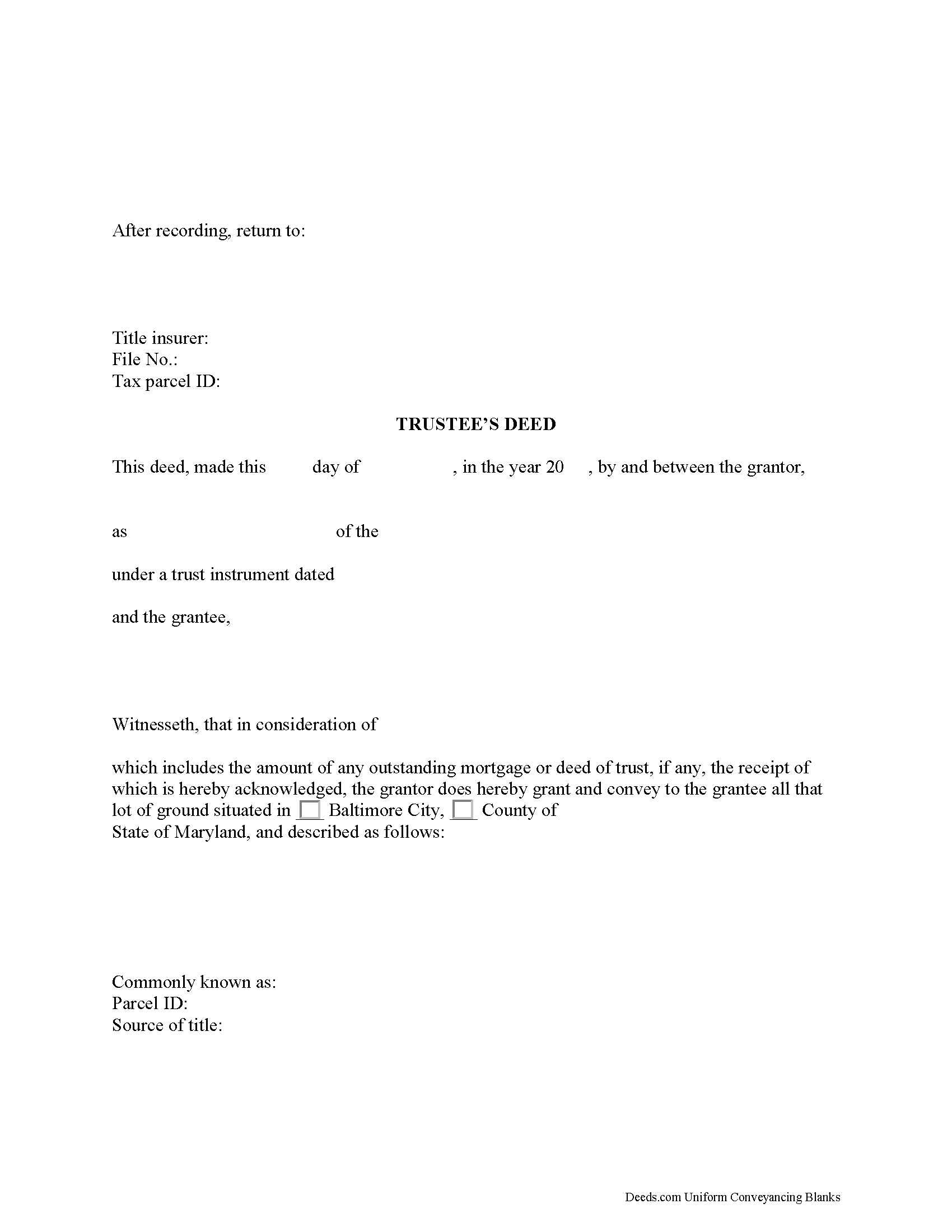
Trusts formed in Maryland are governed by the Estates and Trusts Article of the Maryland Code. Effective since January 1, 2015, the Maryland Trust Act (MTA) under Title 14.5 is adapted from the Uniform Trust Code and supplements the prior Maryland Discretionary Trust Act codified under Title 14.
According to Black's Law Dictionary, 8th ed., a trust is "a property interest held by one person (the trustee) at the request of another (the settlor) for the benefit of a third party (the beneficiary)." The settlor executes a trust instrument establishing the terms of the trust and "contributes property to a trust" (Md. Code Ann., Estates and Trusts 14.5-103(v)(1)).
In a living trust, the trustee holds title to property at the request of the settlor, and as such, conveyances of trust property must be made through the trustee, who generally has a power of sale under the trust instrument. Transferring real property held in trust to another party requires the use of a trustee's deed.
Trustees' deeds take their name from the person conveying the property, rather than from the type of warranties of title they carry, as with warranty deeds or quitclaim deeds. In Maryland, the trustee'... More Information about the Maryland Trustee Deed
Personal Representative Deed
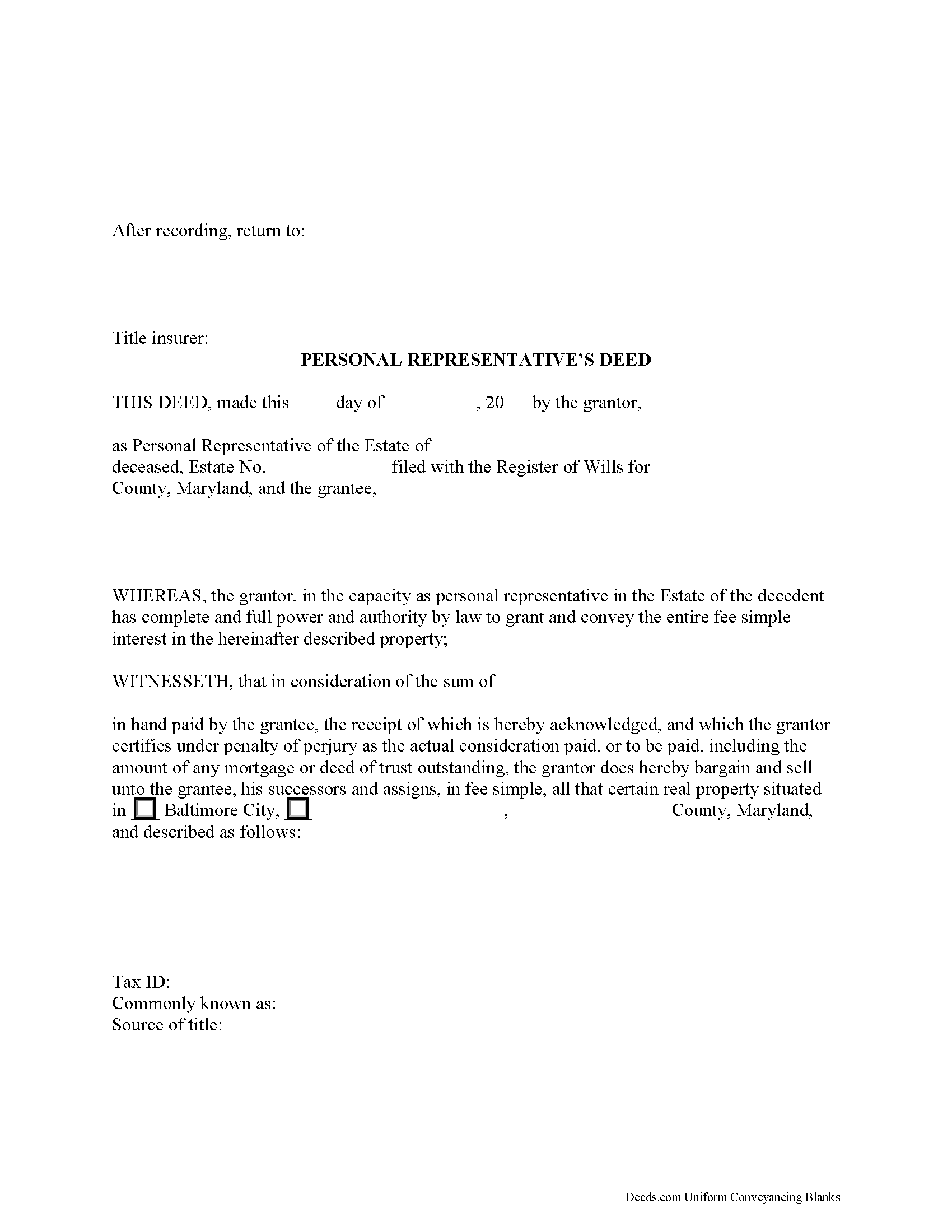
When someone dies, his or her property will more than likely be subject to probate. Probate is the court-supervised process of transferring a decedent's property to those entitled to receive it. In Maryland, the Orphans' Court handles probate in each judicial jurisdiction.
Excluding property held with a survivorship interest, beneficiary designation, or in a trust, all the decedent's property is subject to administration through probate. In Maryland, the process of estate administration is governed by the Maryland Estates and Trusts Code.
Probate is initiated in the Office of the Register of Wills. Following petition for probate, the court appoints a personal representative (PR) of the estate. In some states, the PR may be called an "executor" (when named by the decedent's will) or an "administrator" (when selected by the court). Maryland, however, uses the general term "personal representative" (PR) in both instances.
The court issues letters of administration to commence the PR's duties. This includes marshalling the decedent's assets, taking inventory of the estate, paying the relevant taxes, valid debts, and administrative costs, and distributing the estate to heirs.... More Information about the Maryland Personal Representative Deed
Notice to Owner
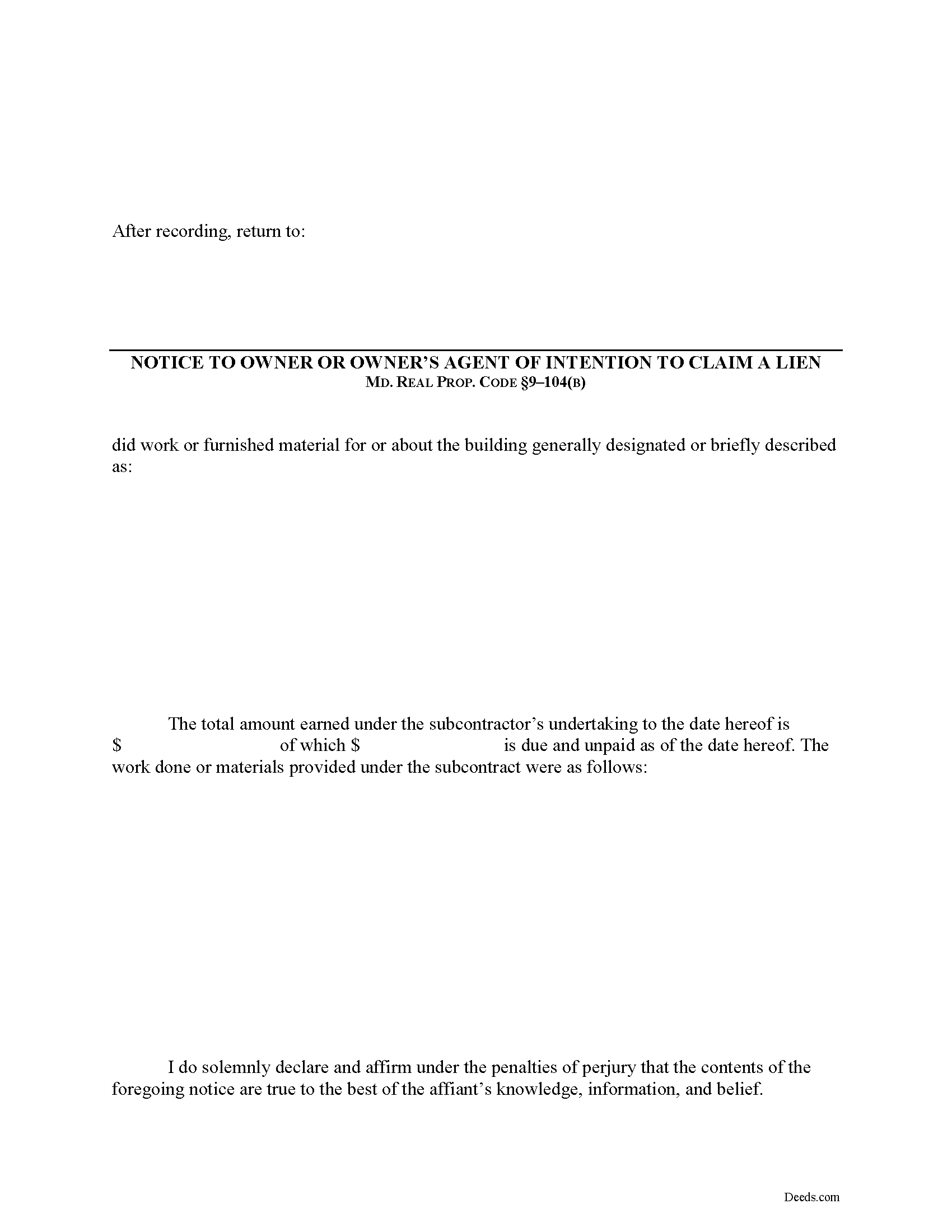
Before filing or recording a mechanic's lien in Maryland, lien claimants must serve the owner (or the owner's agent) with a preliminary notice. In Maryland, this is called a "Notice to Owner of Intention to Claim a Lien." The required type of notice and time limitations depend on who the customer is and what kind of job is involved.
A subcontractor doing work or furnishing materials or both for or about a building other than a single-family dwelling being erected on the owner's land for his own residence is not entitled to a lien under this subtitle unless, within 120 days after doing the work or furnishing the materials, the subcontractor gives written notice of an intention to claim a lien. Md. Real Prop. Code, section 9-104(a)(1).
With regard to residential dwellings, a subcontractor doing work or furnishing materials or both for a single family dwelling being erected on the owner's land for his own residence is not entitled to a lien under this subtitle unless, within 120 days after doing work or furnishing materials for or about that project, the subcontractor gives written notice of an intention to claim a lien as described above, and the owner has not made full payment... More Information about the Maryland Notice to Owner
Notice of Mechanics Lien
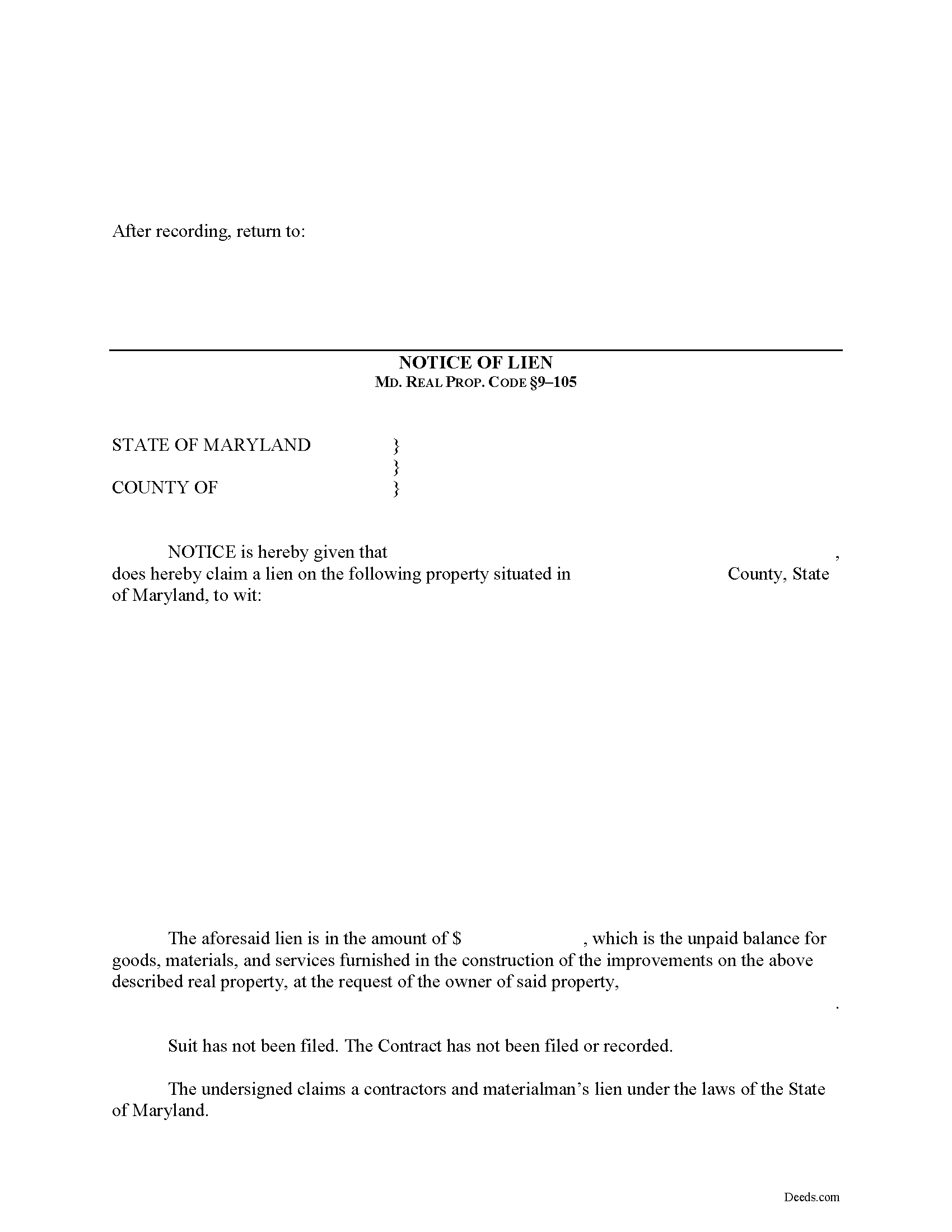
Establishing a Maryland Mechanic's Lien
Mechanic's Liens are used to place a block or burden on a property owner's title when a claimant (such as a contractor, materials supplier, or other laborer such as a subcontractor) has not been paid for labor, materials, or equipment provided. In Maryland, mechanic's liens are governed under Chapter 9 of the real property code.
In order to establish a lien, a person entitled to a lien must first file proceedings in the circuit court for the county where the land or any part of the land is located within 180 days after the work has been finished or the materials furnished. Md. Real Prop. Code section 9-105(a).
Under Md. Real Prop. Code section 9-105(a)(1), the petition must set forth at least the following:
(i) The name and address of the petitioner;
(ii) The name and address of the owner;
(iii) The nature or kind of work done or the kind and amount of materials furnished, the time when the work was done or the materials furnished, the name of the person for whom the work was done or to whom the materials were furnished, and the amount or sum claimed to be due, less any credit recognized by the petitioner;
(iv) A description of ... More Information about the Maryland Notice of Mechanics Lien
Mechanics Lien Complaint
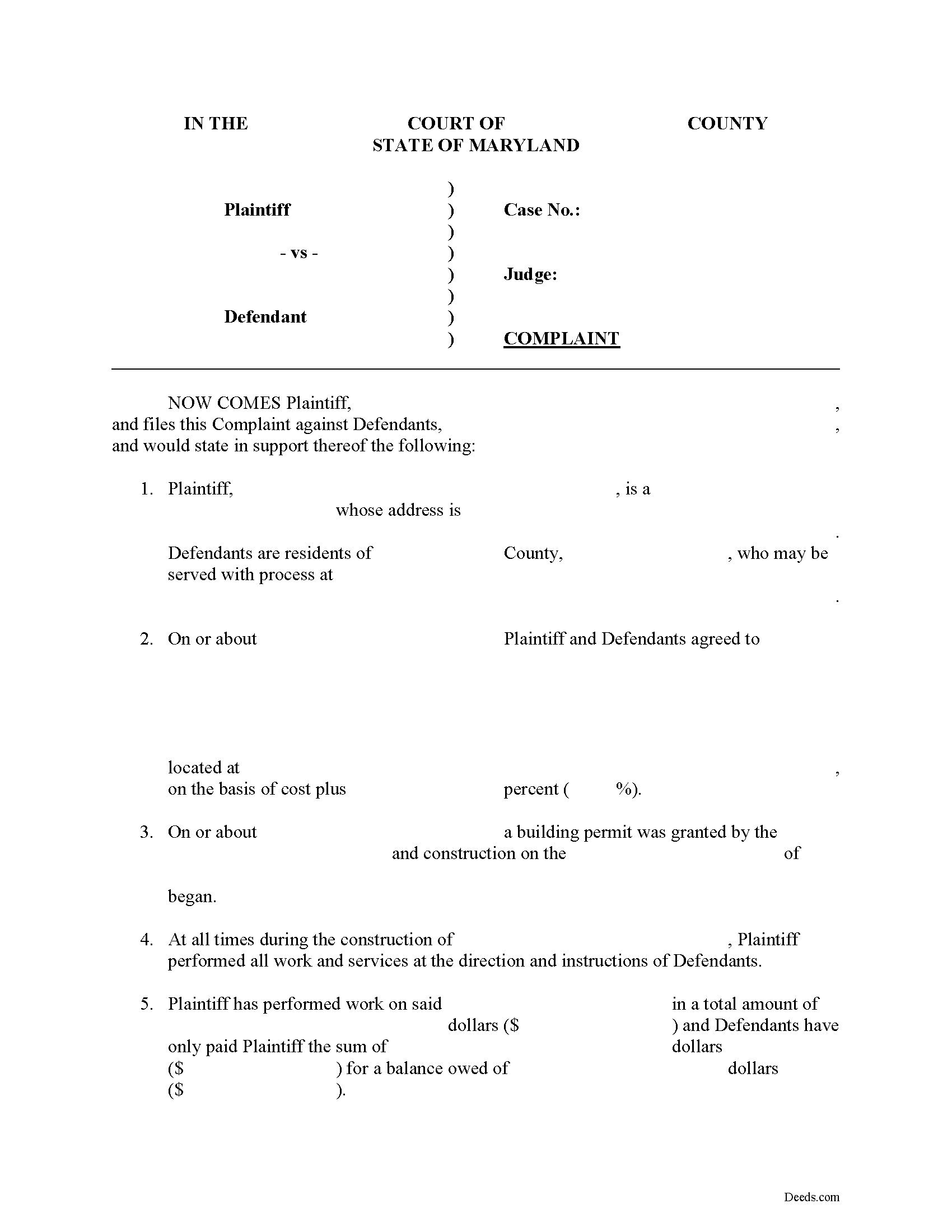
Enforcing a Mechanic's Lien in Maryland with Judicial Proceedings
Once a lien is placed on a property, the lien is only good as long as it can be enforced. Enforcement on a mechanic's lien is accomplished by foreclosing on the lien through judicial proceedings. At this point, it is highly recommended to use an attorney in any action to enforce the lien.
The right to enforce any lien established expires at the end of one year from the day on which the petition to establish the lien was first filed. Md. Real Prop. Code section 9-109. During this time, the claimant may file a petition (a complaint) in the lien proceedings to enforce the lien or execute on any bond given to obtain a release of the land and building from the lien. Id. If such petition is filed within the one year period, the right to a lien or the lien, or any bond given to obtain a release of lien, shall remain in full force and effect until the conclusion of the enforcement proceedings and thereafter only in accordance with the decree entered in the case. Id.
The requirements for filing the lien complaint are governed under the Maryland Rules of Civil Procedure (MRCP). Therefore, best practices would involve ... More Information about the Maryland Mechanics Lien Complaint
Mechanics Lien Release
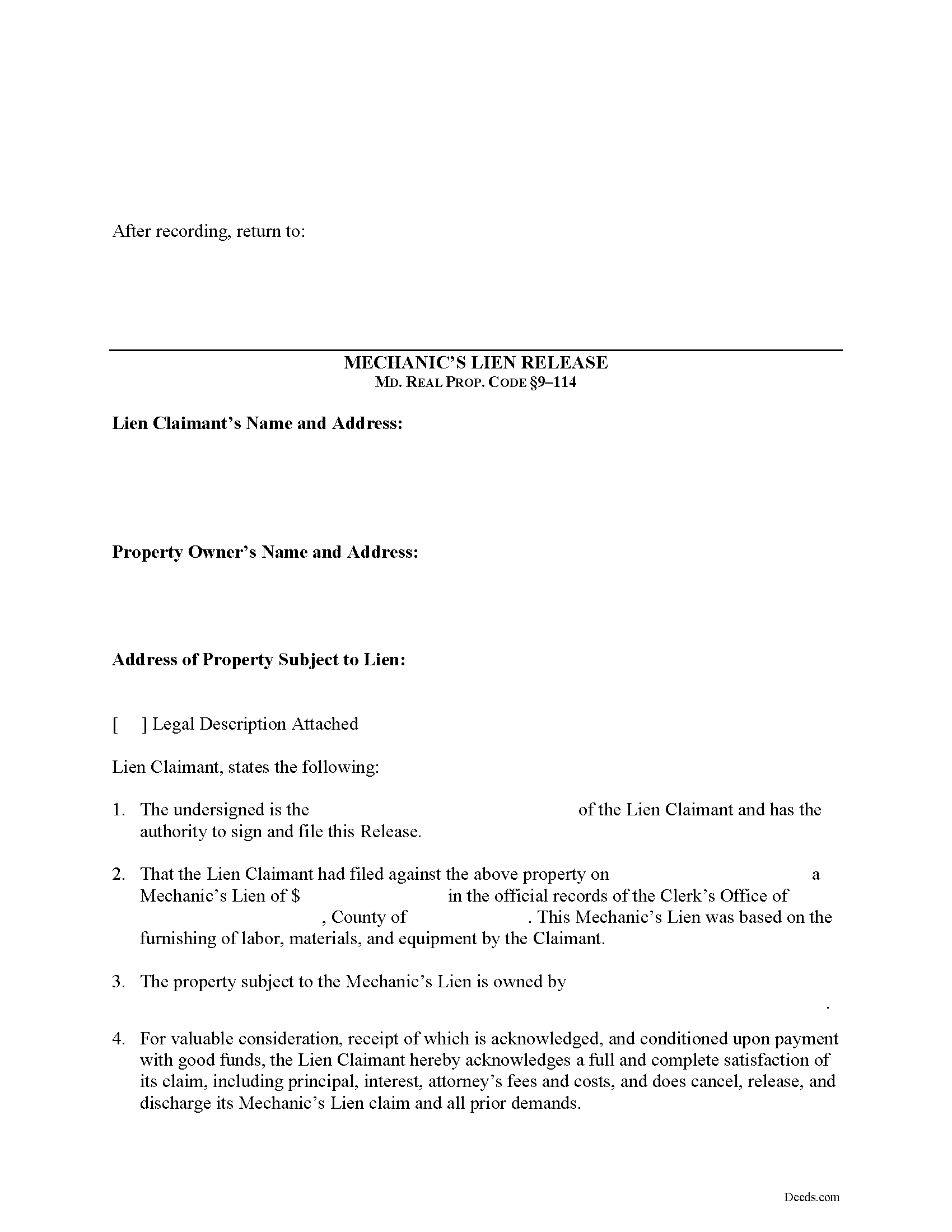
Releasing a Mechanic's Lien in Maryland
In Maryland, when a mechanic's liens placed on a property has been paid off or satisfied for any reason, the lien should be properly discharged by filing a lien release in the county registry of deeds in the county where the lien was originally recorded. The owner is also entitled under state law to have the lien lifted upon satisfying the lien obligation. Maryland does not mandate a statutory form for releasing a lien, but a document identifying the lien and the subject property is sufficient to order its release.
At the time of settlement or payment in full between a contractor and an owner, the contractor shall give to the owner a signed release of lien from each material supplier and subcontractor who provided work or materials under the contract. Md. Real Prop. Code 9--114(a).
A valid lien release identifies the parties, the location of the project, relevant dates, details about the previously recorded lien, and all other information necessary for the specific situation. File the release with the recording office for the county where the property subject to the lien is located.
This article is provided for informational pur... More Information about the Maryland Mechanics Lien Release
Conditional Lien Waiver on Progress Payment
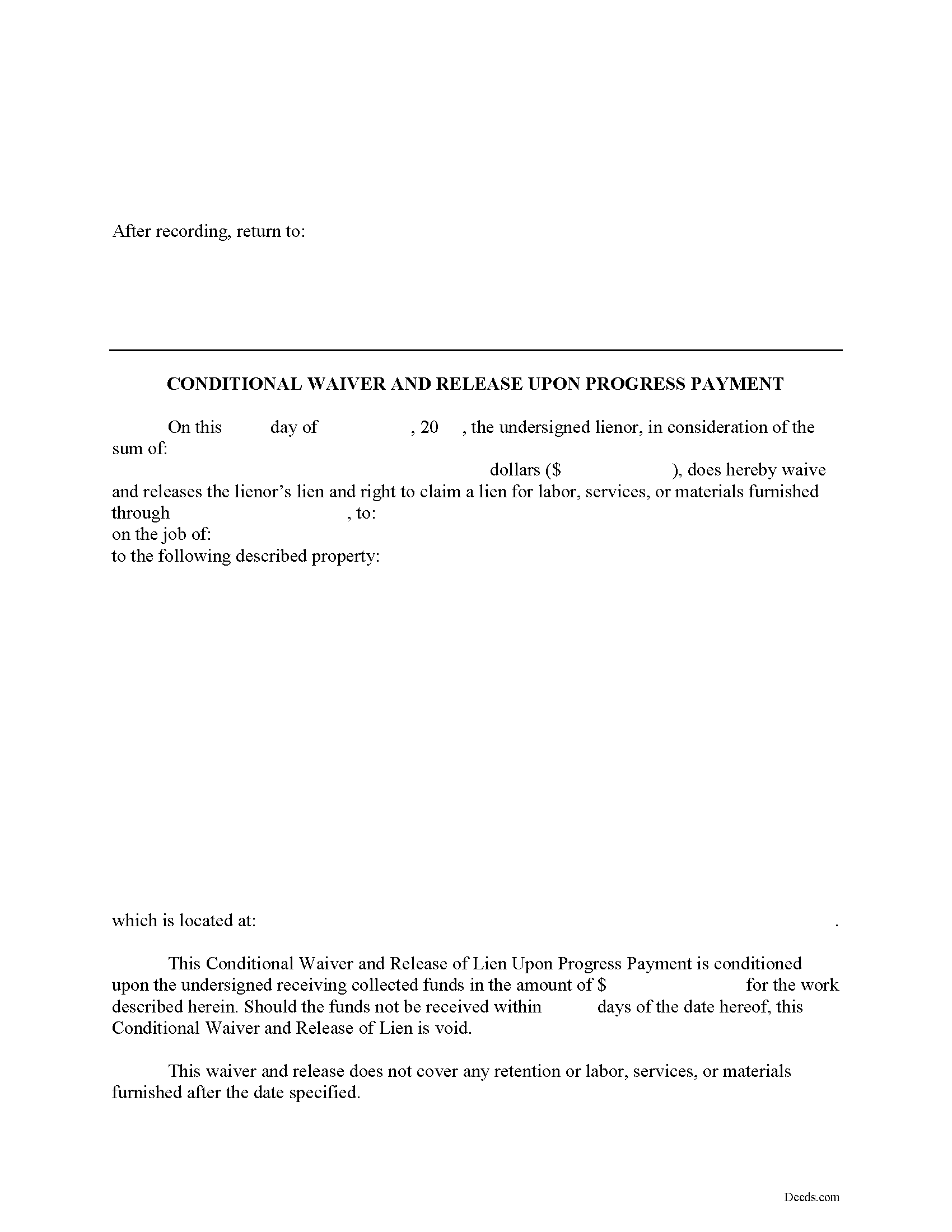
Conditional Waiver and Release of Lien on Progress Payment
In Maryland, mechanic's liens are governed under Chapter 9 of the Maryland Real Property Code. The term "waiver" refers to giving up a legal right. In this case, the person granting the waiver is giving up the right to seek a mechanic's lien for all or part of the amount due. This assurance is usually enough to get the other party to pay. Maryland does not use statutory forms for waivers; according to the principles of contract law, the parties may agree to such modifications in writing. Maryland law, however, specifically prohibits any waiver requirement in a contract. Md. Real Prop. Code sections 9-113.
Typically, waivers come in four varieties: unconditional after a progress payment, unconditional after the final payment, conditional after a progress payment, and conditional after the final payment. Unconditional means the waiver is granted immediately, while conditional waivers depend on the property owner meeting specific requirements (conditions), such as the payment clearing the bank, before the waiver takes effect. So, unconditional waivers benefit the owner, and conditional waivers tend to favor the claimant.... More Information about the Maryland Conditional Lien Waiver on Progress Payment
Unconditional Lien Waiver on Progress Payment
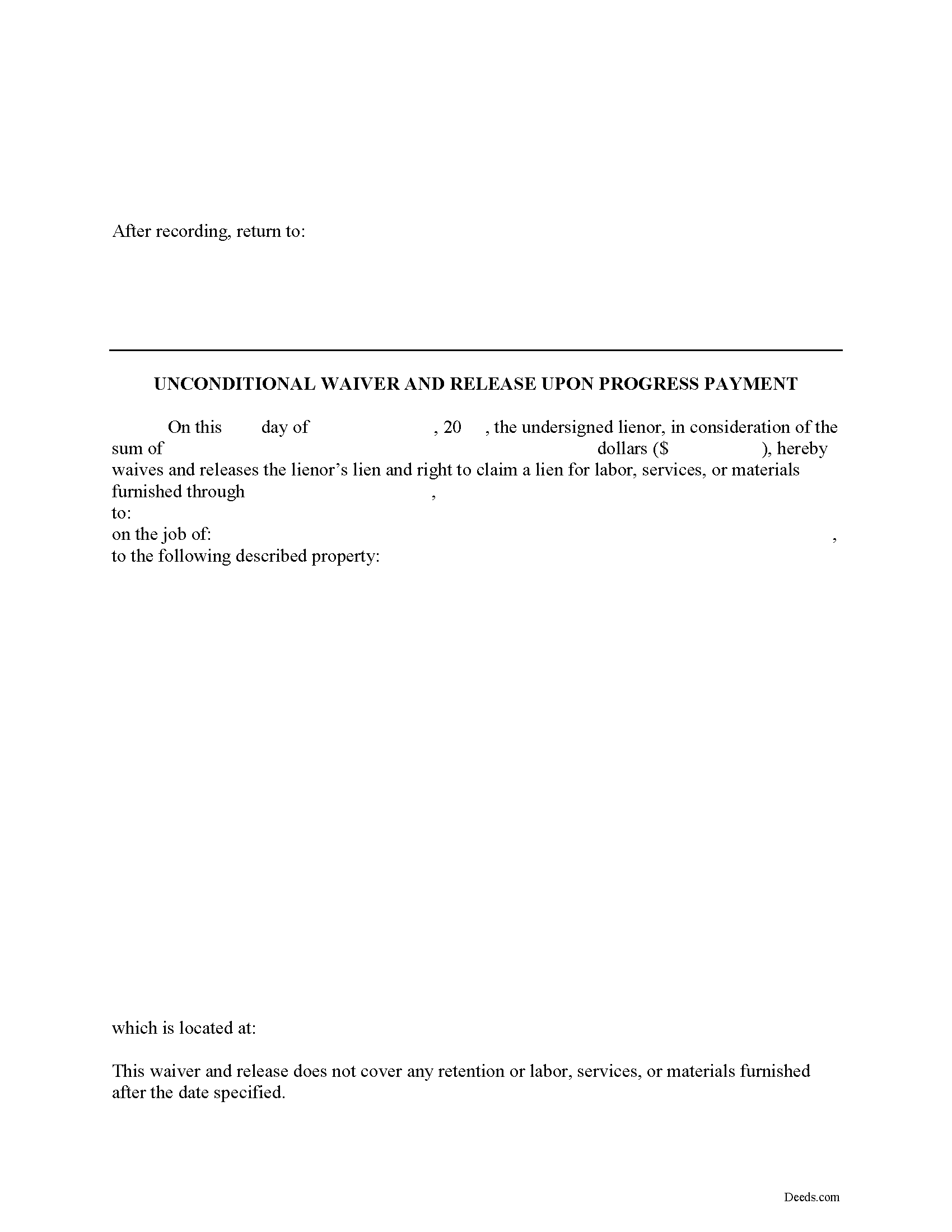
Unconditional Waiver and Release of Lien on Progress Payment
In Maryland, mechanic's liens are governed under Chapter 9 of the Maryland Real Property Code. The term "waiver" refers to giving up a legal right. In this case, the person granting the waiver is giving up the right to seek a mechanic's lien for all or part of the amount due. This assurance is usually enough to get the other party to pay. Maryland does not use statutory forms for waivers; according to the principles of contract law, the parties may agree to such modifications in writing. Maryland law, however, specifically prohibits any waiver requirement in a contract. Md. Real Prop. Code sections 9-113.
Typically, waivers come in four varieties: unconditional after a progress payment, unconditional after the final payment, conditional after a progress payment, and conditional after the final payment. Unconditional means the waiver is granted immediately, while conditional waivers depend on the property owner meeting specific requirements (conditions), such as the payment clearing the bank, before the waiver takes effect. So, unconditional waivers benefit the owner, and conditional waivers tend to favor the claiman... More Information about the Maryland Unconditional Lien Waiver on Progress Payment
Conditional Lien Waiver on Final Payment
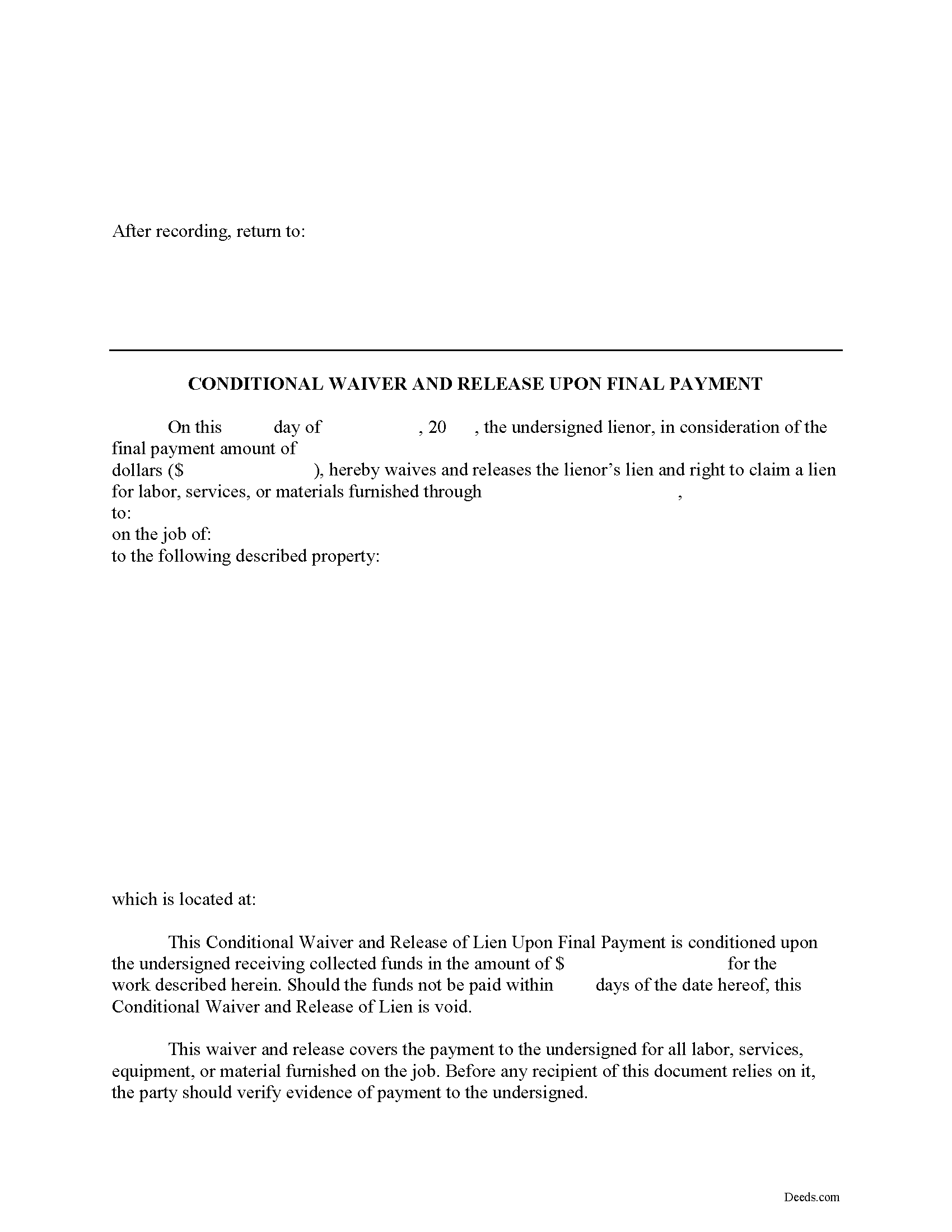
Conditional Waiver and Release of Lien on Final Payment
In Maryland, mechanic's liens are governed under Chapter 9 of the Maryland Real Property Code. The term "waiver" refers to giving up a legal right. In this case, the person granting the waiver is giving up the right to seek a mechanic's lien for all or part of the amount due. This assurance is usually enough to get the other party to pay. Maryland does not use statutory forms for waivers; according to the principles of contract law, the parties may agree to such modifications in writing. Maryland law, however, specifically prohibits any waiver requirement in a contract. Md. Real Prop. Code sections 9-113.
Typically, waivers come in four varieties: unconditional after a progress payment, unconditional after the final payment, conditional after a progress payment, and conditional after the final payment. Unconditional means the waiver is granted immediately, while conditional waivers depend on the property owner meeting specific requirements (conditions), such as the payment clearing the bank, before the waiver takes effect. So, unconditional waivers benefit the owner, and conditional waivers tend to favor the claimant. T... More Information about the Maryland Conditional Lien Waiver on Final Payment
Unconditional Lien Waiver on Final Payment
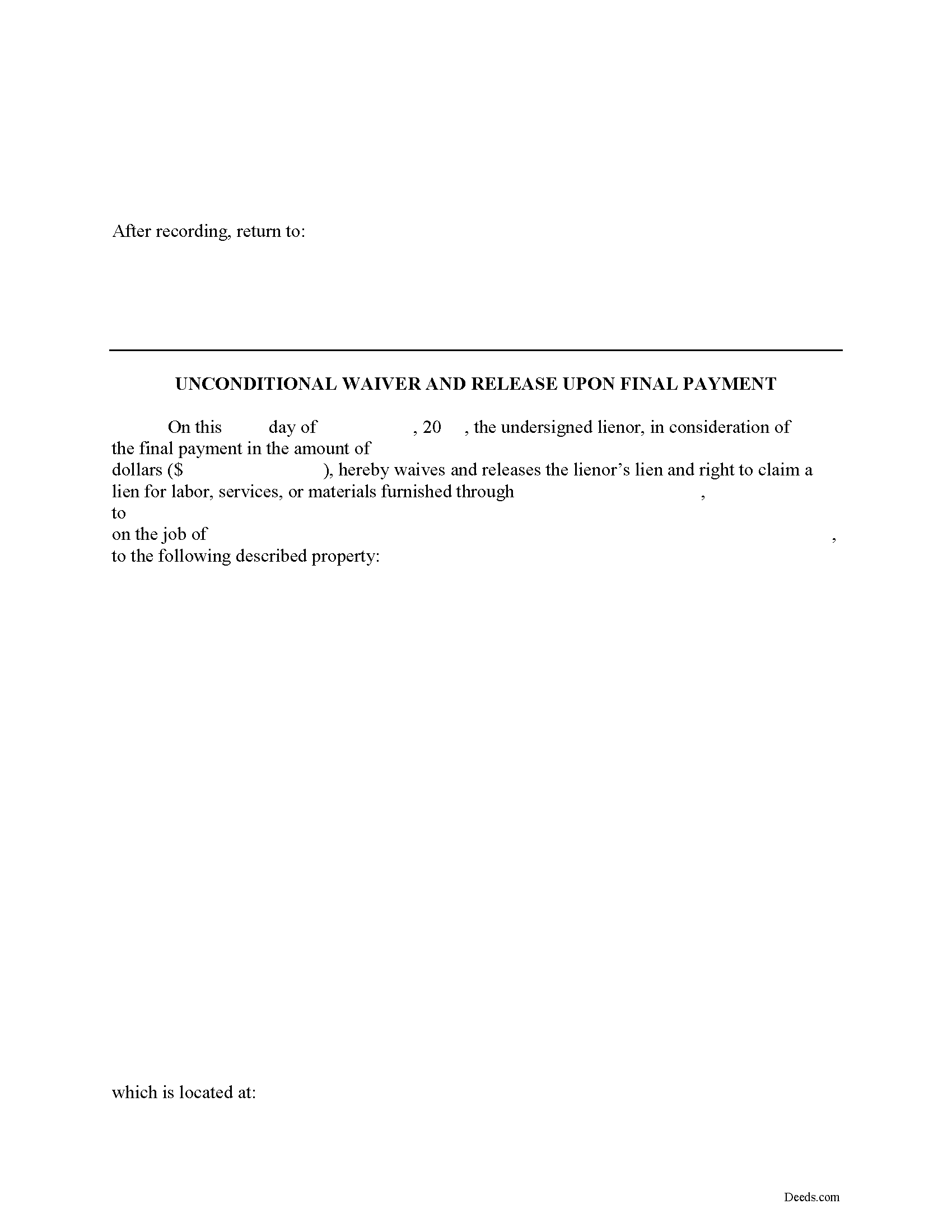
Unconditional Waiver and Release of Lien on Final Payment
In Maryland, mechanic's liens are governed under Chapter 9 of the Maryland Real Property Code. The term "waiver" refers to giving up a legal right. In this case, the person granting the waiver is giving up the right to seek a mechanic's lien for all or part of the amount due. This assurance is usually enough to get the other party to pay. Maryland does not use statutory forms for waivers; according to the principles of contract law, the parties may agree to such modifications in writing. Maryland law, however, specifically prohibits any waiver requirement in a contract. Md. Real Prop. Code sections 9-113.
Typically, waivers come in four varieties: unconditional after a progress payment, unconditional after the final payment, conditional after a progress payment, and conditional after the final payment. Unconditional means the waiver is granted immediately, while conditional waivers depend on the property owner meeting specific requirements (conditions), such as the payment clearing the bank, before the waiver takes effect. So, unconditional waivers benefit the owner, and conditional waivers tend to favor the claimant. ... More Information about the Maryland Unconditional Lien Waiver on Final Payment
Disclaimer of Interest
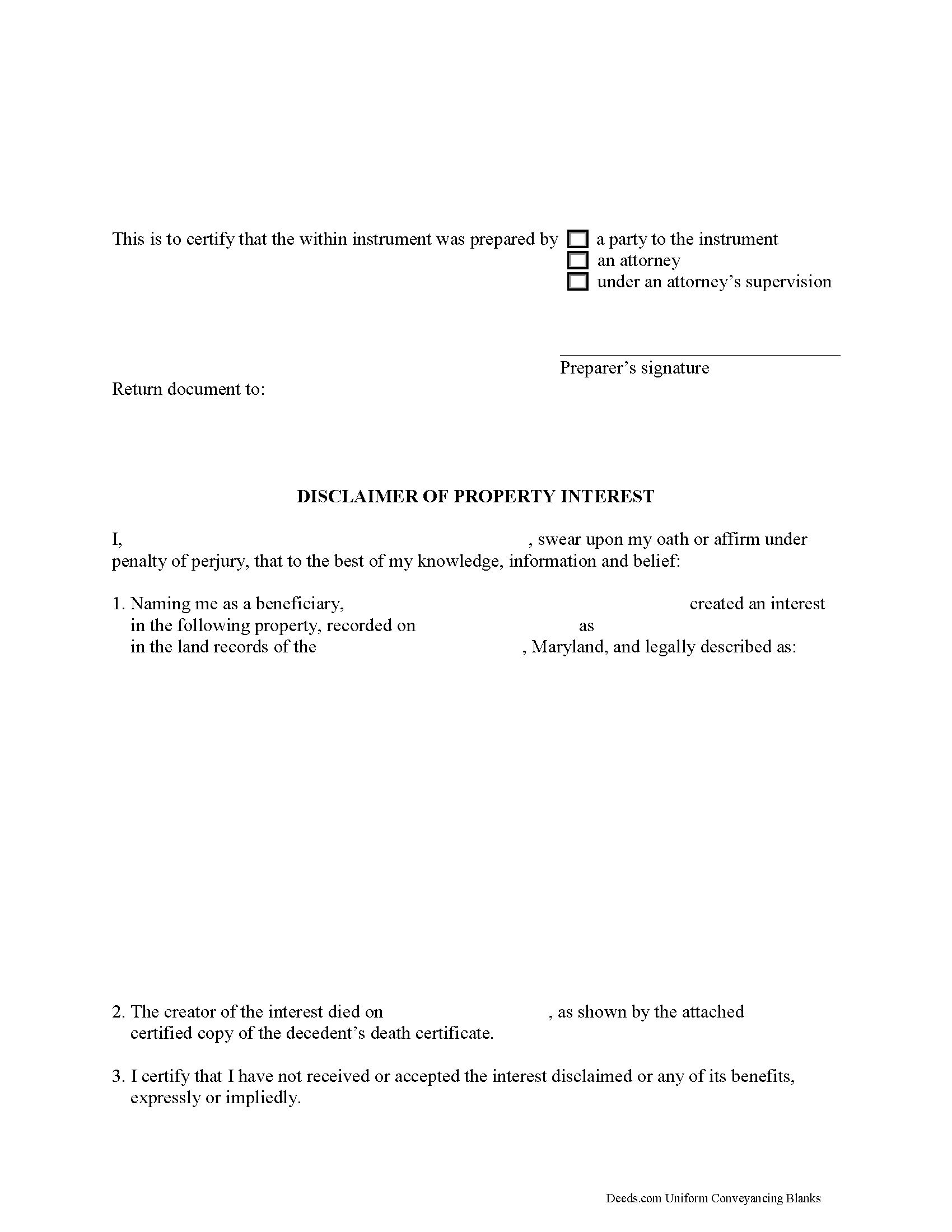
Under the Code of Maryland, the beneficiary of an interest in property may renounce the gift, either in part or in full ( 9-202). Note that the option to disclaim is only available to beneficiaries who have not acted in any way to indicate acceptance or ownership of the interest ( 9-210).
The disclaimer must be in writing and include a description of the interest, a declaration of intent to disclaim all or a defined portion of the interest, and be signed by the disclaimant ( 9-202 (c)).
Deliver the disclaimer within nine months of the transfer (e.g., the death of the creator of the interest) to the transferor or his representative or the holder of legal title ( 9-209). In the case of real property, acknowledge the disclaimer as is required for a deed and record it in the county where the property is located.
A disclaimer is irrevocable and binding for the disclaiming party and his or her creditors, so be sure to consult an attorney when in doubt about the drawbacks and benefits of disclaiming inherited property. If the disclaimed interest arises out of jointly-owned property, seek legal advice as well.
(Maryland DOI Package includes form, guidelines, and completed e... More Information about the Maryland Disclaimer of Interest
Certificate of Trust
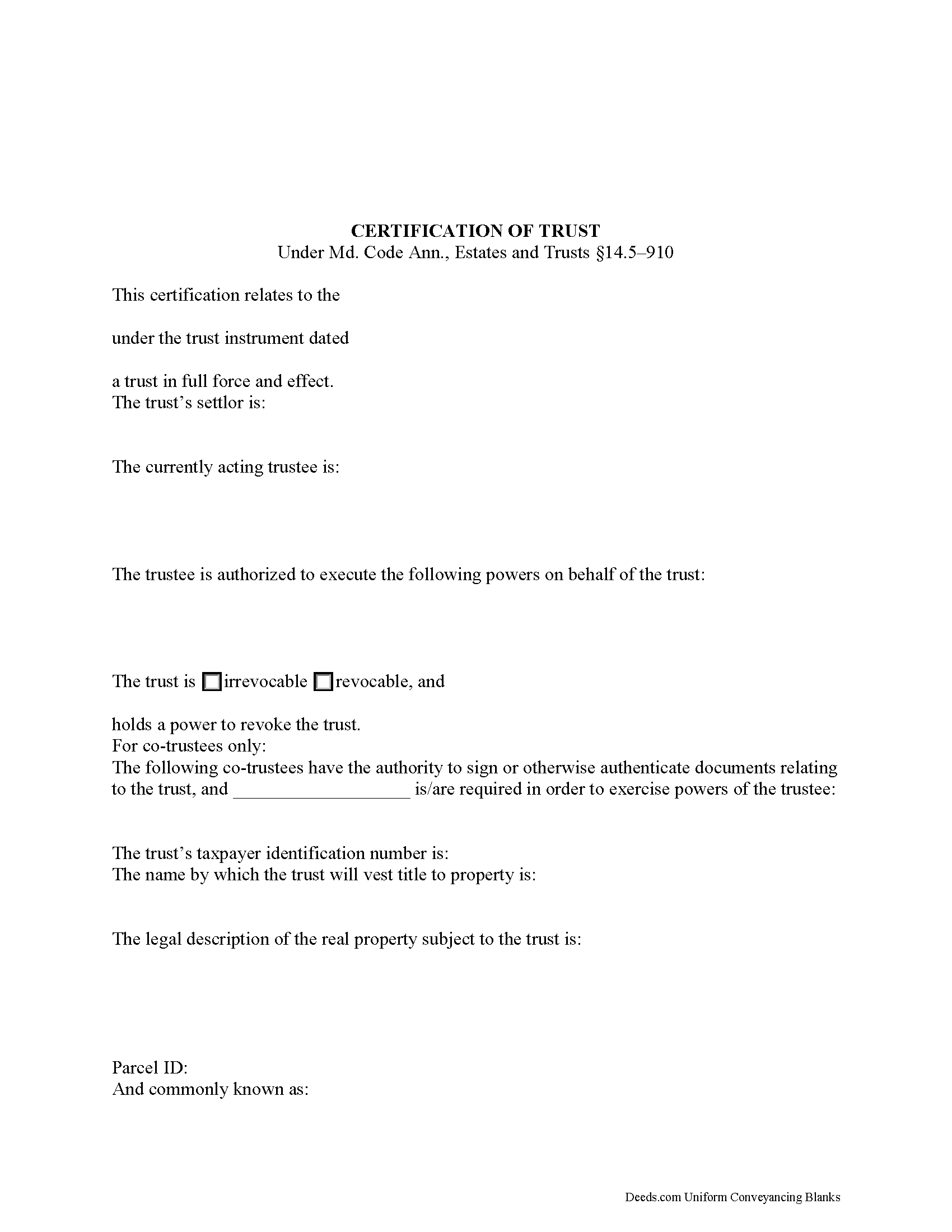
How to Execute a Maryland Certification of Trust
The certification of trust is codified under 14.5--910 of the Estates and Trusts Article of the Maryland Code. The document is an abbreviation of a trust instrument, verifying the trust's existence and the trustee's authority to enter into the impending transaction.
A certification of trust contains only information essential to the transaction at hand; for example, it need not provide the dispositive terms of the trust, so the identities of trust beneficiaries remain private. The rights of certain persons to obtain the trust instrument are reserved for the instances stated under Md. Code Ann., Estates and Trusts 14.5-910(h).
The information required in a Maryland certification of trust includes a statement that the trust exists, the date of the trust instrument under which it was formed, and the identity of the trust's settlor. A settlor is defined under the Maryland Trust Act as "a person...that creates or contributes property to a trust" and can include more than one person (Md. Code Ann., Estates and Trusts 14.5-103(v)).
The certificate includes the name and address of each acting trustee at the time of the certificat... More Information about the Maryland Certificate of Trust